

How to Pray Jummah While Traveling?
In the religion of Islam, Almighty Allah has provided us with many conveniences in worshiping. As a matter of fact, travel is one of these situations because for a person who leaves his place of residence to travel, there may be difficulties in performing the prayer on time or in accordance with the conditions of worship. One of these situations is the loss of the Friday prayer obligation during the journey.
If you are traveling on Friday, you might wonder how to pray Jummah while travelling and if it is compulsory to pray Jummah while travelling. In Islam, the Jummah prayer time is not obliged to perform the those who are as travellers during Jummah time. Therefore if you are wondering how to pray Jummah while travelling, you should know that without a doubt this Jummah (and also Eid) prayers are not obligatory for the traveller.
Below, you can find detailed information about how the Prophet performed Friday prayers during a journey.
Is It Compulsory to Pray Jummah While Traveling?
It is stated as follows in Hadith:
Abu’l-‘Aliyat al-Bara’ reported: ‘’ I said to ‘Abdullah b. Samit: We say our Jummah prayer behind those rulers who defer the prayer. He (‘Abdullah b. Samit), struck. my thigh that I felt pain and said: I asked Abu Dharr about it, he struck my thigh and said: I asked the Messenger of Allah (may peace be upon him) about it. Upon this he said: Observe prayer at its prescribed time, and treat prayer along with them (along with those Imams who deter prayer) as Nafl. ‘Abdullah said: It was narrated to me that the Messenger of Allah (may peace be upon him) struck the thigh of Abd Dharr. ‘’ (Muslim, Book 4, Number 1359)
On the other hand it states in al-Sharh al-Kabeer (2/154):
“Whoever of these people – travellers, slaves and women – attends Jumu’ah, does not have to pray Zuhr, and we know of no dispute on this point.’’
Based on this, it is emphasized that it is not compulsory to perform Jummah prayers for travellers. It is clearly stated that people who are considered travellers do not have to perform Jummah prayers and attend Jummah Khutbah. Our religion has clearly brought convenience for travelers.
Despite this convenience, if a traveller finds an opportunity to pray Jummah, İslamic scholars agree that it will be a substitute for the Dhuhr prayer. Because a prayer to a person only becomes fard on time.
How Was Prophet (ﷺ) Performing Jummah While Travelling?
The actions of Our Prophet ( ﷺ) are considered as Sunnah in our religion, and Sunnah is one of the four basic sources of Islam. For this reason, it is very important for us to know whether the Prophet performed the Friday prayer while traveling.
As we all know, the Messenger of Allah often had to travel for various reasons. For example, he organized more than twenty military campaigns. However, there is no reported record that he performed Jummah prayer or the Eid prayer during any of his travels. On the other hand, the Prophet ( ﷺ) continued his journey by performing the Fard prayers and if these prayers can be shortened, he performed only 2 Rakats of them.
It should be also clearly stated that for those wondering if the Prophet ( ﷺ) was performing Jummah while travelling, there are no reports that say he preached a khutbah on a Friday when he was travelling or standing on his own two feet or from atop his camel, as he used to do on Eid, or from a minbar, as he used to do on Fridays.
As explained from above, Friday prayer and Khutba are not obligatory for travelers. A person traveling on Friday at noon is obligated only to perform the Dhuhr prayer. If you are wondering how to perform salah while traveling and how to shorten the prayer while traveling, you can find more information about these questions by clicking here.
Travelling on Friday Before The Prayer Is Due
Another subject of concern to our Muslim brothers and sisters on Friday is whether is it allowed to travel before the time of Friday prayers. Because in this case, the person starts the journey without waiting for the time of Jummah prayer. As regards travelling before the time of the Friday prayer begins, some Islamic scholars agree that it is permissible, others are of the view that it is disliked, yet others are of the view that it is forbidden.
According to the view of scholars of Shafi’i, it is considered haram for a person who is obliged to perform the Friday prayer to depart after Fajr on Friday. However, it is not haram for a person who thinks that he can perform the Friday prayer while on the road, or who goes on a fard journey such as a pilgrimage to which he is afraid that the time is getting shorter, or if he has to be afraid of being alone. But it is not makruh to set out before dawn.
According to the view of scholars of Hanafi, it is makruh to leave the city until the Jummah prayer is performed after the first adhan of Friday is recited. But it is not makruh to leave the city before zawal.
However it is always better for a Muslim to delay his travel until after praying the Friday prayer in order to avoid the difference of opinion. Unless there is a need to travel before the Jummah prayer, in which case it is permissible to travel on the condition that one travels before the starting time of the Friday prayer.
Finally, it should be remembered that Islamic Scholars disagree on this issue only in terms of people who do not have a dire need to travel at that time. Because if he has really an unavoidable situation to travel, then this is permissible to travel before or at time of Friday prayer.
Allah Knows The Best.
- Dua & Dhikr
- Prophets Stories
- Prayer Time
How to pray Jummah Prayer
Jummah, or Friday prayer, is the congregational prayer (Salah) that Muslims hold every Friday, just after noon, in the place of Dhuhr. It is considered one of the most important elements of the Islamic faith and has been ordained in the Qur'an. The Jummah prayer is an obligation that is required of all adult male Muslims and is to be performed in congregation, usually at a mosque.
The Jummah prayer consists of the Khutbah (sermon) and the Salah (prayer). The prayer itself is shorter than the usual Dhuhr prayer, involving only two Rak’ahs, whereas Dhuhr has four.
Before the prayer, a sermon is delivered by the Imam, or prayer leader, who stands on the minbar (a pulpit) and addresses the congregation. The sermon serves as spiritual and moral guidance for Muslims, often covering various topics from the Qur'an and Hadiths and contemporary issues relevant to the Muslim community.
The Prophet Muhammad (Peace Be Upon Him) said: "The five daily prayers, and from one Jummah to the next, are an expiation for whatever sins come in between, so long as one does not commit any major sin." (Sahih Muslim). This highlights the importance of the Jummah prayer in the spiritual life of a Muslim.
Women, children, the sick, travelers, and others not required to attend the congregational prayer may still choose to attend the Jummah prayer for its blessings, or they can pray Dhuhr Salah at home as usual.
However, it's important to remember that due to the ongoing COVID-19 pandemic, many countries and localities have specific rules and guidelines for public gatherings, including religious services. Therefore, the arrangements for Jummah prayer may vary depending on local regulations. Always follow local public health guidelines when considering attending communal prayers.
Jummah, or Friday prayer, holds a special place in Islam. It is the best day of the week, with numerous virtues and rewards. Here are some of the virtues of the Jummah prayer:
1. The Best Day of the Week: The Prophet Muhammad (Peace Be Upon Him) said, "The best day on which the sun has risen is Friday; on it, Adam was created, on it he was admitted to Paradise, and on it, he was expelled from it." (Sahih Muslim)
2. A Day of Eid: Jummah is also considered a day of celebration (Eid) in Islam. It is a day of gathering for Muslims where they can meet, pray in congregation, listen to the Khutbah (sermon), and benefit from the spiritual and social aspects of the community.
3. Greater Reward for Good Deeds: Good deeds performed on Friday, including charity, recitation of the Qur'an, Dhikr (remembrance of Allah), and making Dua (supplications), are rewarded more than the same deeds performed on other days of the week.
4. Expiation of Sins: The Prophet Muhammad (Peace Be Upon Him) said, "The five daily prayers, and from one Jummah to the next, are an expiation for whatever sins come in between, so long as one does not commit any major sin." (Sahih Muslim)
5. A Day of Remembrance: Jummah is a day of remembrance of Allah and seeking knowledge. The sermon (Khutbah) provides spiritual and moral guidance and allows Muslims to gain beneficial knowledge.
6. An Opportunity for Forgiveness: There is a period on Friday during which all Duas (supplications) are accepted. The Prophet Muhammad (Peace Be Upon Him) said, "On (the day of) Jummah is an hour during which Allah gives to a Muslim servant standing in prayer whatever he asks for." (Al-Bukhari and Muslim)
The Jummah prayer is a highly virtuous act of worship in Islam, with many benefits and rewards. It is a time for Muslims to come together in unity, to learn, to worship, and to seek the mercy and blessings of Allah.
There are various recommended acts of worship (Sunnah) that Muslims are encouraged to perform, particularly on special occasions like the day of Jummah (Friday), but also generally throughout their daily lives. Here are some of them:
1. Ghusl (Ritual Bath): It is recommended to perform a full-body purification ritual before attending the Jummah prayer. This ensures physical cleanliness, a crucial aspect of Islamic prayer.
2. Wearing Nice Clothes and Using Perfume: It is also recommended to wear the best clothes for the Jummah prayer and, if possible, to use perfume. This is part of honoring the sanctity of the day.
3. Reading Surah Al-Kahf: The Prophet Muhammad (Peace Be Upon Him) recommended the recitation of Surah Al-Kahf (Chapter 18 of the Qur'an) on Fridays. This can be done any time between the break of dawn on Friday and the break of dawn on Saturday.
4. Early Arrival for Jummah Prayer: Going early to the Mosque for Jummah prayer is highly recommended. The earlier one goes, the greater the reward.
5. Making Lots of Dua (Supplication): There is an "hour" (period) on Friday when all supplications are accepted. The exact timing of this hour is unknown, but it is thought to be sometime in the afternoon, possibly after Asr prayer or just before Maghrib.
6. Sending Blessings Upon the Prophet Muhammad: It is recommended to send blessings (Salawat) upon the Prophet Muhammad (Peace Be Upon Him) on Fridays, as this act has great rewards.
7. Giving Sadaqah (Charity): Giving in charity is always recommended, especially on Fridays. It can be in the form of money, food, clothing, or even a kind act.
8. Engaging in Dhikr (Remembrance of Allah): Engaging in the remembrance of Allah throughout the day, such as by saying Subhanallah (Glory be to Allah), Alhamdulillah (Praise be to Allah), Allahu Akbar (Allah is the Greatest), Astaghfirullah (I seek Allah's forgiveness) is highly recommended.
9. Seeking Knowledge: Listening to the Jummah Khutbah (sermon), reading Islamic books, and seeking knowledge, in general, are highly recommended.
10. Fasting: Although not specific to Fridays, it is a Sunnah to fast on Thursdays and Mondays, and it is also recommended to fast on the white days (13th, 14th, and 15th of each lunar month), which often fall on or around Fridays.
These acts of worship are recommended and greatly rewarded, but they are not obligatory. The obligatory act on Friday is to perform the Jummah prayer in the congregation if possible. As always, the intention behind these actions should be to seek the pleasure of Allah.
The Jummah prayer is obligatory for all adult male Muslims, replacing the Dhuhr prayer on Fridays. Here is a step-by-step guide on how to perform the Jummah prayer:
1. Preparation: Perform Ghusl (ritual bath), if possible, and wear clean clothes. It is Sunnah (recommended) to use perfume and to wear your best clothes on this day. Make your way to the mosque early if possible; as the Prophet Muhammad (Peace Be Upon Him) said, "When it is a Friday, the angels stand at the gate of the mosque and keep on writing the names of the persons coming to the mosque in succession according to their arrivals." (Sahih Bukhari)
2. Sunnah Prayers Before Jummah: When you arrive at the mosque, it is recommended to perform two Rak’ahs or four Rak’ahs of voluntary prayer as a greeting to the mosque (Tahiyyat al-Masjid).
3. Listen to the Khutbah (Sermon): The Imam will deliver two sermons from the Minbar (pulpit). Listening attentively to the Khutbah is essential, which usually contains beneficial reminders and lessons. Engaging in other activities, including praying Sunnah prayers or talking, is discouraged while the Khutbah is being delivered.
4. The Jummah Prayer: After the conclusion of the second Khutbah, the Imam will lead the congregation in a two Rak’ah prayers. Follow the Imam as you would in any other congregational prayer.
· In the first Rak’ah, after Surah Al-Fatiha, the Imam may recite verses from Surah Al-A'la or another passage from the Qur'an. Follow silently.
· You will then go into Ruku (bowing) and Sujood (prostration) as guided by the Imam.
· In the second Rak’ah, after Surah Al-Fatiha, the Imam may recite verses from Surah Al-Ghashiya or another passage from the Qur'an. Follow silently and continue the prayer as usual, completing it with Tashahhud and Tasleem (saying "Assalamu alaikum wa rahmatullah" to the right and then to the left).
5. Sunnah Prayers After Jummah: After the obligatory Jummah prayer, you may choose to pray four Rak’ahs or two Rak’ahs of Sunnah prayer at the mosque or home.
6. Du'a (Supplication): After the Jummah prayer, it is an excellent time to make Du'a, as Friday is a blessed day, and Du'as made on this day are more likely to be accepted.
This guide is based on the common practice and traditions of many Muslims.
Related Posts
Leave a comment.
Your email address will not be published. Required fields are marked *
Recent Posts

How To Pray Salat Al-Duha?
Salat Al-Duha: Salat al-Duha, also known as Duha prayer, is a voluntary Isla...
Sun 06, 2023

How to Pray Eid Salah (Namaz)?
Eid Prayer: The Eid prayer is a special prayer that Muslims perform to mark...

How to pray Salat al-Janazah?
Salat al-Janazah: Salat al-Janazah, also known as the funeral prayer, is a p...
Popular Posts


- date converter
- Ramadan Imsakiah 2024
- Dua (azkar)
- أسمى الله أل حسنى
- God bless Al Hosna
- Zakat Calculator
- Popular Islamic videos
- Muslim Sadiq shop
- Download the application
Welcome to PrayerTimes Site
Best Source for the Most Accurate Athan and Prayer Times Discover More
# Azan Times # Prayer Times # x
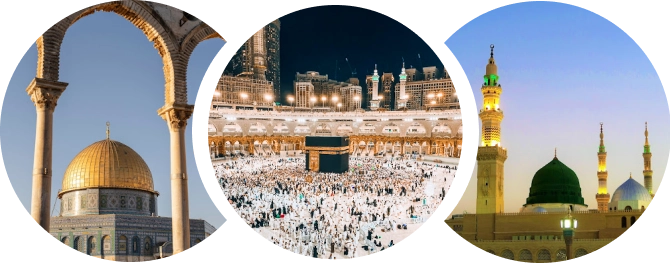
Jumu’ah Prayer: The Ultimate Guide to Enhancing Your Spiritual Journey
Juggling your daily responsibilities and Jumu’ah, the Muslim Friday prayer, can sometimes be challenging. Did you know that Prophet Muhammad (PBUH) stressed the importance of this special day and its blessings?
We help simplify this routine by offering practical tips for preparation, performance, and making the most of your Fridays in our comprehensive guide to understanding and embracing the importance of Jumu’ah prayer.
Stay tuned as we unpack these insights to help high-performing Muslims worldwide maximize their spiritual productivity from each Jumma day!
Understanding Jumu’ah (Muslim Friday Prayer)
This obligatory prayer is critical in fostering Muslim unity, serving as a spiritual gathering focused on communal worship and reflection.
During Jumu’ah prayer, mosque Imams address social issues affecting the Muslim community through sermons (Khutbahs).
They use this platform not only to provide spiritual insights, but also to discuss practical solutions based on the Quran and Sunnah for the daily challenges that today’s high-performing Muslims face.
Jumu’ah promotes fundamental Islamic values like brotherhood and peace while discouraging evil. This makes it an essential part of Fridays for all practicing Muslims worldwide.
The Importance of Jumu’ah in Muslim Prayers
Importance Of Jumu’ah in the Quran
Many Quran verses and hadith reflect the significance of this spiritual day. Here’s a verse from Surah Jum’uah, which is named after this holy day:
يَـٰٓأَيُّهَا ٱلَّذِينَ ءَامَنُوٓا۟ إِذَا نُودِىَ لِلصَّلَوٰةِ مِن يَوْمِ ٱلْجُمُعَةِ فَٱسْعَوْا۟ إِلَىٰ ذِكْرِ ٱللَّهِ وَذَرُوا۟ ٱلْبَيْعَ ۚ ذَٰلِكُمْ خَيْرٌۭ لَّكُمْ إِن كُنتُمْ تَعْلَمُونَ
O believers! When the call to prayer is made on Friday, then proceed ˹diligently˺ to the remembrance of Allah and leave off ˹your˺ business. That is best for you, if only you knew. (62:9)
Allah SWT has made it illegal for believers to conduct any business during this time. It demonstrates its significance in the eyes of Allah SWT.
Spiritual Significance
Purification rituals on this day, as highlighted by Prophet Muhammad (PBUH), erase sins from one Friday to the next, increasing spiritual purity.
As they prepare for Salatul Jumu’ah, devotees immerse themselves in reciting Surat al-Kahf and other Qur’an verses, reinforcing their faith commitment.
This weekly practice facilitates deep introspection about one’s deeds over the previous week while fostering personal development toward becoming a high-performing Muslim.
The Rahmat-Jumma Day brings Noor, or divine light, which illuminates believers until the following Friday, demonstrating its profound spiritual significance within the Islamic tradition.
Community Bonding:
Every week, Muslims gather in mosques or designated places of worship for Jumu’ah prayer. It demonstrates their unity and solidarity as a community.
They collectively reflect on Islamic teachings, societal issues, spiritual productivity, and personal development, guided by the sermons (Khutbahs) delivered by Imams.
Professions divide, but Islam unites. Even though all Muslims have different ways of living and earning money, on this day all Muslims come together at the Mosque, which fosters a sense of brotherhood among all Muslims.
The weekly gathering is critical in fostering strong community bonds and promoting ethical values among Muslims worldwide.
Weekly Reflection and Renewal
Muslims benefit from the weekly practice of Jumu’ah prayer for reflection and renewal. It serves as a reminder to slow down, take a breather, and reconnect with our spirituality.
Every Friday, we have the opportunity to reflect on the previous week’s events, reassess our priorities, and ask for forgiveness for any shortcomings or mistakes. This self-analysis enables us to spiritually mature and become better Muslims.
We can strengthen our connection with Allah SWT and His teachings by praying Jumu’ah. We gain valuable insights into our faith and its relevance in our daily lives by actively listening to the Imam.
The khutbahs frequently address essential issues such as morality, compassion, gratitude, patience, and the pursuit of knowledge.
This weekly renewal is not only for personal development, but also for strengthening ties within the Muslim community. The congregational component of Jumu’ah prayer brings people from all walks of life together in communal worship.
It allows for social interaction before and after prayer, with Muslims greeting one another with warm smiles and kind words.
Muslims are encouraged to reach out and connect with fellow believers who are not in their immediate circle during the weekly Friday gathering. As they gather in one place, united by their shared faith, they gain a stronger sense of belonging.
Jumu’ah is Similar to Eid
1. On both of these occasions, we offer two Rakahs.
2. Both Eid and Jumu’ah Prayer include khutbahs.
3. Fasting on Eid is forbidden, but fasting on Friday is discouraged.
We can also deduce something from the following hadith of Prophet Muhammad PBUH.
“ إِنَّ هَذَا يَوْمُ عِيدٍ، جَعَلَهُ اللَّهُ لِلْمُسْلِمِينَ. فَمَنْ جَاءَ إِلَى الْجُمُعَةِ فَلْيَغْتَسِلْ. وَإِنْ كَانَ طِيبٌ فَلْيَمَسَّ مِنْهُ. وَعَلَيْكُمْ بِالسِّوَاكِ ”
‘This day is an ‘Eid (festival) which Allah has ordained for the Muslims. Whoever comes to Friday (prayer), let him take a bath and if he has perfume then let him put some on. And upon you (I urge to use) is the tooth stick.” Sunan Ibn Majah 1098
The Performance of Jumu’ah Prayer
Continue reading to gain additional insights and knowledge of the Jumu’ah prayer.
Pre-Prayer Rituals
There are some pre-prayer rituals that Muslims should remember before performing the Jumu’ah prayer. These pre-prayer rituals help prepare individuals mentally and physically for this important congregational prayer.
1. Taking a Bath: It is strongly advised to take a bath on Friday before attending Jumu’ah prayer, as this act of purification not only cleanses the body but also symbolizes spiritual cleansing and sin forgiveness. Jami’ at-Tirmidhi 528
2. Wearing Clean Clothes: Muslims are encouraged to wear clean and neat clothes to Friday prayer as a sign of respect for the occasion and devotion to Allah SWT.
3. Using Perfume: Using perfume or wearing a fragrance before attending Jumu’ah prayer improves personal hygiene and improves one’s overall presentation. Jami’ at-Tirmidhi 528
4. Nail Trimming: Trimming nails before Jumu’ah prayer is preferred because it promotes cleanliness and good hygiene.
5. Arriving Early at the Mosque: Arriving early at the mosque for Jumu’ah prayer allows individuals to secure a good place in the congregation and be present throughout the entire khutba delivered by the Imam.
6. Offering Sunnah Prayers: As an additional act of worship, it is recommended to offer two rak’ahs of voluntary Sunnah prayers before the obligatory Jumu’ah prayer.
7. Listening Attentively to the khutba: Muslims should listen attentively to the khutba without engaging in any conversation or distractions, as this aids in gaining knowledge, reflecting on its message, and enhancing spirituality.
8. Making Dua (Supplication): Muslims are encouraged to use the moments before the start of Jumu’ah prayer for personal supplication (Dua), in which they can pray for their own needs, seek forgiveness from Allah SWT, and ask Him for blessings and guidance.
Prophet Muhammad PBUH Has Good News
This hadith from Prophet Muhammad PBUH gives Muslims a reason to keep going early to the Jumu’ah Prayer:
” مَنِ اغْتَسَلَ يَوْمَ الْجُمُعَةِ وَغَسَّلَ وَبَكَّرَ وَابْتَكَرَ وَدَنَا وَاسْتَمَعَ وَأَنْصَتَ كَانَ لَهُ بِكُلِّ خَطْوَةٍ يَخْطُوهَا أَجْرُ سَنَةٍ صِيَامُهَا وَقِيَامُهَا ”
“Whoever performs Ghusl on Friday, and bathes completely, and goes early, arriving early, gets close and listens and is silent, there will be for him in every step he takes the reward of a year of fasting and standing (in prayer).” Jami` at-Tirmidhi 496
The Sermon (Khutba)
Khutba is an integral part of the Jumu’ah prayer. The khutba is a speech delivered by an Imam or a knowledgeable speaker on a variety of relevant topics in order to remind and educate worshippers about their faith and responsibilities.
It provides an opportunity for instruction, guidance, and reflection. The khutba is usually divided into two parts: a religious reminder based on Quran verses or hadiths (sayings and actions of Prophet Muhammad PBUH), and advice that can be practiced daily.
This powerful aspect of Jumu’ah aids in developing understanding, strengthening faith, and inspiring positive action among Muslims. Furthermore, it offers valuable insights into social issues affecting the community as a whole, while encouraging unity and compassion for one another.
Go To The Masjid Before khutba Starts
What if you could get a weekly reward for sacrificing a camel for the sake of Allah SWT? Would you prefer to leave it or take it? If so, carefully read the following hadith:
“من اغتسل يوم الجمعة غسل الجنابة، ثم راح في الساعة الأولى فكأنما قرب بدنة”
“He who takes a bath on Friday, like the bath for ceremonial purity, and then goes (to the mosque), he is like one who offers a camel as a sacrifice to seek the Pleasure of Allah.” Riyad as-Salihin 1155
The Prayer (Salat)
The Salat starts with an adhan (call to prayer), which marks the beginning of the congregational gathering.
Muslims then gather in mosques or designated prayer areas to hear the Imam’s khutbah, which provides guidance and reminders from Islamic teachings. Following the khutba, the Imam leads a two rak’ah (unit) prayer.
Jumu’ah Routine: Making the Most Out of Friday
Preparing for the Prayer
The following steps will help you to fully prepare for the Jumu’ah prayer:
1. Before going to the mosque, shower and purify yourself. According to Prophet Muhammad (PBUH), taking a bath on Fridays results in the forgiveness of sins committed between that day and the previous Friday.
2. Put on clean, neat clothes. Fridays should be dressed to impress as a mark of respect for this special day.
3. If desired, apply perfume or fragrance, which is considered Sunnah (the practice of the Prophet PBUH).
4. Arrive at the mosque early to ensure enough time to perform ablution (wudu). This allows you to stay focused and calm during the sermon (khutbah) and prayer (Salat).
5. Bring necessary items such as a small bag for personal belongings and a shoe carrier bag. This will help you save time and organize your belongings while you are at the mosque.
6. To avoid distractions during prayer, turn off your phone or set it to silent mode.
Avoid This At All Cost During Jumu’ah Prayer
Never step over anyone’s neck during khutba because a prophet’s terrifying hadith describes the consequences.
مَنْ تَخَطَّى رِقَابَ النَّاسِ يَوْمَ الْجُمُعَةِ اتَّخَذَ جِسْرًا إِلَى جَهَنَّمَ ””
“Whoever steps over the necks of the people on Friday, he has taken a bridge to Hell.” : Jami` at-Tirmidhi 513
Nonetheless, many people commit this heinous sin due to a lack of knowledge. If you heard it for the first time, please tell others about it. May Allah SWT have mercy on us.
Reading Surat Al-Kahf
One of the most important practices on Jumu’ah day is reading Surat Al-Kahf, a chapter from the Holy Quran.
This act is significant to Muslims because it is believed to bring a special light that will shine on the reader until the following Friday. Prophet Muhammad PBUH said:
“من قرأ سورةَ الكهفِ يومَ الجمعةِ أضاء له النُّورُ ما بينَه و بين البيتِ العتيق”
“Whoever reads Surat al-Kahf on the day of Jumu’ah, will have a light that will stretch between him and the Ka’bah.”
(Narrated by al-Darimi, 3407. This hadith was classed as sahih by Shaykh al-Albani in Sahih al-Jami, 6471)
Taking the time to recite Surat Al-Kahf is thus not only a spiritual act, but also an opportunity for inner reflection and seeking Allah’s guidance throughout the coming week.
Utilizing the Last Hour for Dua
Muslims have a golden opportunity to make a heartfelt Dua (supplication) in the final hour before Maghrib on Friday. This hour is regarded as a time of guaranteed acceptance by Allah SWT, and it is strongly advised to plan desired Duas during this time.
Taking just 10-15 minutes to reflect and pray to Allah SWT for all of your needs can result in enormous blessings. According to the Prophet Muhammad PBUH, Duas made during this sacred hour are more likely to be answered.
So, don’t waste this precious time – use the last hour of Friday for Dua and witness the power of sincere supplication.
Incorporating Family Time
Incorporating family time is a great way to have an intellectual discussion about the Khutba insights. If women are unable to attend the Friday prayer, you can share all of the insights with them during your family time!
It’s a good idea to set aside a special Friday night for your family to discuss the valuable gems gleaned from khutba. Your family bond will strengthen as a result, as will your faith.
By incorporating family time into their Jumu’ah routine, Muslims can foster a nurturing environment within their homes that fosters love, understanding, and growth.
The Virtues and Sunnahs of Jumu’ah
Wearing Clean and Neat Clothes
Wearing clean and neat clothes is essential not only for personal hygiene, but also for spiritual and cultural reasons. Muslims are encouraged to dress their best for Friday prayer because it shows respect for this special day and demonstrates one’s devotion to Allah SWT.
When attending Jumu’ah prayers, Prophet Muhammad (PBUH) emphasized the importance of cleanliness and wearing presentable attire. It is believed that by dressing well, believers demonstrate their gratitude to Allah SWT for His blessings while also demonstrating unity within the Muslim community.
Furthermore, wearing clean clothes can improve one’s concentration during prayer and contribute to a sense of calm and serenity in the mosque. So, every Friday, let us make an effort to dress our best for Jumu’ah prayers, as this not only benefits our spiritual connection with Allah SWT but also promotes a positive impression within our community.
“ مَنِ اغْتَسَلَ يَوْمَ الْجُمُعَةِ فَأَحْسَنَ غُسْلَهُ، وَتَطَهَّرَ فَأَحْسَنَ طُهُورَهُ، وَلَبِسَ مِنْ أَحْسَنِ ثِيَابِهِ، وَمَسَّ مَا كَتَبَ اللَّهُ لَهُ مِنْ طِيبِ أَهْلِهِ، ثُمَّ أَتَى الْجُمُعَةَ وَلَمْ يَلْغُ وَلَمْ يُفَرِّقْ بَيْنَ اثْنَيْنِ، غُفِرَ لَهُ مَا بَيْنَهُ وَبَيْنَ الْجُمُعَةِ الأُخْرَى ” .
Whoever takes a bath on a Friday and does it well, and purifies himself and does it well, and puts on his best clothes, and puts on whatever Allah SWT decrees for him of the perfume of his family, then comes to the mosque and does not engage in idle talk or separate (pushing between) two people; he will be forgiven for (his sins) between that day and the previous Friday.” Sunan Ibn Majah 1097
Early Arrival at the Mosque
«مَن توضأ فأحسنَ الوُضوء، ثم أتى الجمعةَ فاسْتمعَ وأَنْصَتَ غُفِرَ له ما بينه وبين الجمعة وزيادةُ ثلاثة أيام، ومَن مَسَّ الحَصا فقد لَغا»
“He who performs ablution properly, then comes to the Friday prayer and listens to it attentively and keeps silent, his sins between that Friday and the following Friday will be forgiven, with the addition of three more days; but he who touches a pebble has engaged in idle activity ” [Sahih Muslim]
Arriving early has the following advantages:
1. More time to practice Dhikr and Dua
2. You can get closer to the Imam and receive even more blessings.
3. Giving Allah SWT more time brings you closer to him.
Engaging in Dhikr and Dua:
Engaging in Dhikr (remembrance of Allah SWT) and Dua (supplication) on the day of Jumu’ah is highly recommended for Muslims.
It is a time when our prayers are more likely to be accepted. Prophet Muhammad PBUH said,
فِيهِ سَاعَةٌ لاَ يُوَافِقُهَا عَبْدٌ مُسْلِمٌ، وَهْوَ قَائِمٌ يُصَلِّي، يَسْأَلُ اللَّهَ تَعَالَى شَيْئًا إِلاَّ أَعْطَاهُ إِيَّاهُ
There is an hour (opportune time) on Friday and if a Muslim gets it while praying and asks something from Allah, then Allah will definitely meet his demand.” Sahih al-Bukhari 935
Here are some important ways to practice Dhikr and Dua on this special day:
- After each prayer, recite this adhkaar. SubhanAllah 33 times, Alhumdulillah 33 times, Allahu Akbar 33 times, and once more say La ilaha ill-Allah wahdahu la sharika lahu, lahul-mulk wa lahul-hamd wa huwa ‘ala kulli shayin qadir. Your sins will be washed away like sea foam . (Reported by Muslim, 939)
- Take moments throughout the day to remember Allah SWT with simple phrases such as “SubhanAllah” (glory be to Allah), “Alhamdulillah” (praise be to Allah), and “Allahu Akbar” (Allah is the greatest).
- Make sincere Dua during the final hour before Maghrib prayer, as this is when Allah SWT is more likely to answer our prayers. Ask for forgiveness, guidance, and blessings for yourself and your loved ones and any specific needs or desires you may have.
- Use Surat al-Kahf to seek protection and to strengthen your Imaan (faith). Reading it on Fridays not only brings blessings, but also allows for reflection on its lessons and wisdom.
- If possible, attend communal Dhikr gatherings at the mosque or in your community. These gatherings foster a spiritual atmosphere and unity among believers.
- Personal Dhikr can be done by reciting Quranic verses that speak to you or specific supplications mentioned in authentic hadiths. Consider their meanings and connect with Allah SWT through these lovely words.
- Never underestimate the power of a simple and heartfelt Dua. Spend a few moments each day in private with Allah SWT, pouring out your heart and seeking His guidance, mercy, and forgiveness.
Jumu’ah (Muslim Friday prayer) is very important in Muslim prayers. It serves as a time for spiritual rejuvenation, community bonding, reflection, and renewal.
We can make the most of this blessed day and reap its abundant rewards by understanding the rituals and incorporating key practices into our Friday routine. Let us embrace Jumu’ah’s virtues and sunnah to increase our spiritual productivity and strengthen our connection with Allah SWT.
1. What is Jumu’ah and why is it important in Muslim prayers?
Jumu’ah, also known as the Friday prayer, is a crucial congregational prayer in Islam. It is a required prayer for all adult Muslim males and an optional prayer for females. Jumu’ah is a weekly gathering of Muslims to worship Allah SWT, listen to the sermon (khutbah), and pray in congregation.
2. When does Jumu’ah take place and how long does it last?
Jumu’ah is held every Friday shortly after noon, when the sun begins to set from its zenith until mid-afternoon (usually between 12:30 and 1:30 PM). The prayer usually lasts around 30-40 minutes.
3. Can women attend Jumu’ah prayers? Is it mandatory for them?
While most scholars believe that women are not required to attend Jumu’ah prayers, many women do choose to participate if they can do so safely and comfortably. Some mosques even have separate spaces for female attendees. This may vary depending on local cultural norms and personal preferences.
4. Are there any specific etiquette or dress codes that should be followed during Jumu’ah?
Yes, certain etiquettes and dress codes are suggested during Jumu’ah prayers. Men are encouraged to dress cleanly, preferably in traditional garb such as a thobe or kurta with loose pants. Women should dress modestly, covering their bodies with loose-fitting clothing that covers their hair (for hijab wearers) and arms down to their wrists.
Friday Prayer: The Ultimate Guide to Enhancing Your Spiritual Journey
Understanding the friday prayer (friday prayer), the importance of friday in muslim prayer, the importance of friday in the qur'an, spiritual significance, community cohesion:, weekly meditation and renewal, friday is like a holiday, performing friday prayers, pre-prayer ritual, good news for the prophet muhammad, may god bless him and grant him peace, sermon (sermon), go to the mosque before the sermon begins, prayer (prayer), friday prayer routine: make the most of your friday, prepare to pray, avoid it at all costs during friday prayers, read surat al-kahf, use the last hour to pray, incorporate family time, the virtues of friday and its sunnah, wear clean and neat clothes, early access to the mosque, remembering and praying:.
- After every prayer, recite this dhikr. Glory be to God 33 times, Praise be to God 33 times, God is great 33 times, and once again say there is no god but God alone with no partner, His is the kingdom and His is the praise and He is capable of everything. Your sins will be washed away like sea foam . (Narrated by Muslim (939)
- Take moments throughout the day to remember God Almighty with simple phrases such as “Glory be to God,” “Praise be to God,” and “God is great.”
- Make sincere supplications during the last hour before the Maghrib prayer, because this is the time when God Almighty is most likely to answer our prayers. Ask for forgiveness, guidance, and blessings for yourself, your loved ones, and any specific needs or desires you may have.
- Use Surah Al-Kahf to seek protection and to strengthen your faith. Reading it on Friday not only brings blessings, but also allows meditation on its lessons and wisdom.
- Attend group dhikr gatherings at the mosque or in your community, if possible. These meetings create a spiritual atmosphere and unity among believers.
- Personal dhikrs can be done by reciting Quranic verses that speak to you or specific supplications mentioned in authentic hadiths. Meditate on their meanings and communicate with God Almighty through these beautiful words.
- Never underestimate the power of simple and sincere prayer. Spend a few minutes each day alone with God Almighty, pour out your heart and seek His guidance, mercy and forgiveness.
Related posts

A powerful supplication to break the fast

Powerful supplications for forgiveness from God Almighty

Supplication after the call to prayer and its benefits

A supplication before and after eating
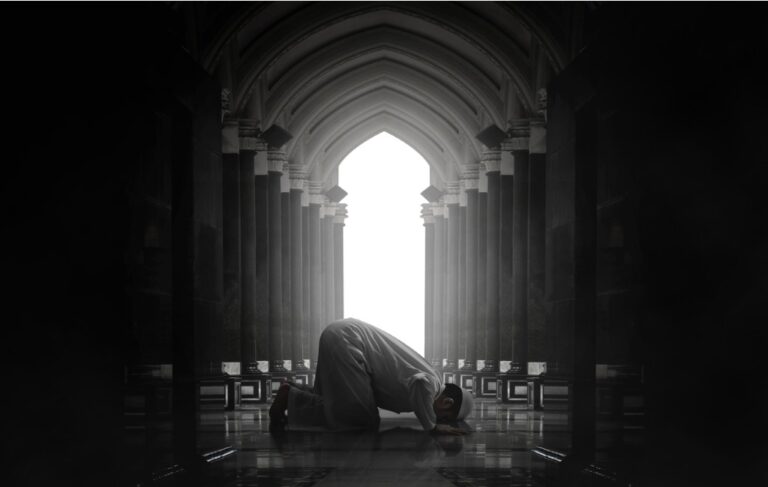
The power of the Istikhara supplication: asking for guidance from God Almighty
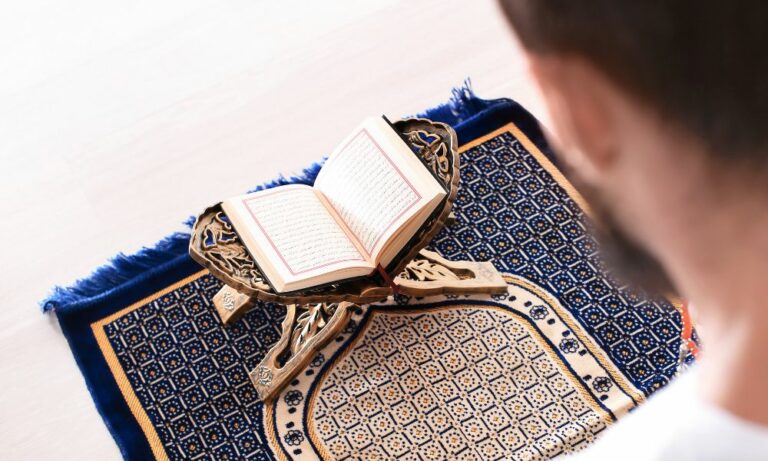
Evil Eye Symptoms: Your Ultimate Treatment Guide

Powered by Aladhan API - All rights reserved.

Jumah Prayer - Significance Of Jumah Prayer
Jummah Prayer - Jumma Prayer - Jumuah Prayer - Jumma Mubarak - Rakats In Jummah Prayer - How to Perform Salat al Jumah - How to perform jummah prayer at home
Jumah Prayer - Significance Of Jumah Prayer - Friday Prayer
Jumah prayer is a congregational prayer that Muslims perform every Friday afternoon in mosques. It is considered one of the most important and significant prayers in Islam. Here are some of the significance and benefits of Jumah prayer:
Obligatory prayer: Jummah prayer is an obligatory prayer for adult Muslim males who are not travelling and can attend the mosque. It is considered a communal obligation, meaning that if enough people in a community are able to attend the prayer, it becomes obligatory for all.
Congregational prayer: Jumah prayer is a congregational prayer, and Muslims are encouraged to attend the mosque and pray together. The Prophet Muhammad (peace be upon him) said that Friday is the best day of the week and that there is a special blessing for those who attend the Jumuah prayer.
Sermon and reminder: Jumah prayer includes a sermon (khutbah) which is delivered by the imam (leader) of the mosque. The sermon serves as a reminder of Islamic teachings and values and provides guidance and advice on issues relevant to the Muslim community.
Blessings and forgiveness: It is believed that attending Jumuah prayer earns great blessings and forgiveness from Allah. The Prophet Muhammad (peace be upon him) said that the person who performs ablution (wudu) and then goes to the Jummah prayer early, sits near the imam, listens attentively to the sermon, and avoids talking or disturbing others, will have all their sins forgiven from the previous Friday to the next.
Community building: Jumuah prayer provides an opportunity for Muslims to come together and strengthen their bonds of brotherhood and sisterhood. It is a time to socialize, meet new people, and build a sense of community and belonging.
In summary, Jumah prayer is an important and significant part of Muslim worship and community life. It serves as a reminder of Islamic values, provides guidance and advice, and earns blessings and forgiveness from Allah. Muslims are encouraged to attend the Jummah prayer regularly and make the most of this special time of the week.
Benefits of Jummah Prayer - Benefits of Friday Prayer
Jumuah prayer, also known as Friday prayer, is one of the most important and significant prayers for Muslims. It is a congregational prayer that takes place every Friday afternoon in mosques around the world. Here are some of the benefits of Jumuah prayer:
Spiritual rejuvenation: Jumuah prayer provides an opportunity for Muslims to connect with Allah and rejuvenate their spirituality. It is a time to reflect on the teachings of Islam, seek forgiveness for sins, and renew one’s faith and commitment to Allah.
Community building: Jumuah prayer brings together Muslims from diverse backgrounds and helps to build a sense of community and brotherhood/sisterhood. It is a time to socialize, meet new people, and strengthen bonds with other Muslims.
Reminder of Islamic values: The khutbah (sermon) that accompanies Jumuah prayer is an opportunity for Muslims to be reminded of Islamic values and principles. The imam may discuss topics such as honesty, humility, patience, and kindness, and offer guidance on how to live a virtuous life.
Blessings and forgiveness: It is believed that attending Jumuah prayer earns great blessings and forgiveness from Allah. The Prophet Muhammad (peace be upon him) said that the person who performs ablution (wudu) and then goes to the Jumuah prayer early, sits near the imam, listens attentively to the sermon, and avoids talking or disturbing others, will have all their sins forgiven from the previous Friday to the next.
Opportunity for dua (supplication): Jumuah prayer provides an opportunity for Muslims to make dua (supplication) and ask Allah for forgiveness, guidance, and blessings. The time between the adhan (call to prayer) and the khutbah is considered a special time for dua, and Muslims are encouraged to make the most of this time.
In summary, Jumuah prayer offers a range of benefits for Muslims, including spiritual rejuvenation, community building, reminders of Islamic values, blessings and forgiveness, and the opportunity for dua. It is an important and significant part of Muslim worship and community life, and Muslims are encouraged to attend regularly and make the most of this special time.
How Many Rakats In Jummah Prayer?
Jummah prayer is an obligatory congregational prayer that Muslims perform every Friday. The Jummah prayer consists of two Rakats, which is the same as the regular obligatory noon prayer (Dhuhr). However, in Jummah prayer, there are additional components such as the Khutbah (sermon) delivered by the Imam before the prayer. After the Khutbah, Muslims perform the two Rakats of Jummah prayer.

Hadith on Juma (Jummah) Rakat
There are various hadiths that mention the Jummah prayer and its rakats. Here are some of them:
- The Prophet Muhammad (PBUH) said, “Whoever performs ghusl on Friday, purifies himself as much as he can, then uses his (hair) oil or perfumes himself with the scent of his house, then proceeds (for the Jummah prayer) and does not separate two persons sitting together (in the mosque), then prays as much as (Allah has) written for him and remains silent while the Imam is delivering the Khutba, his sins in-between the present and the last Friday would be forgiven.” (Sahih al-Bukhari)
This hadith does not mention the number of rakats for the Jummah prayer.
- Jabir (RA) reported that the Messenger of Allah (PBUH) said: “The Jummah prayer is obligatory upon every Muslim in congregation, except for the sick, the traveler, and the one who is stationed far away (from the mosque). It is to be offered in two Rakats, with the Imam delivering a Khutba (sermon) in between them.” (Sahih Muslim)
According to this hadith, the Jummah prayer consists of two rakats, with the Imam delivering a Khutba in between them. Therefore, based on the second hadith, the Jummah prayer consists of two rakats.

Toronto Dawah
Authentic Knowledge, Quraan, Sunnah, Salaf
What is the ruling on attending Jumu’ah while being a traveller?
المجلد: الجامع الصغير رقم الحديث: 0 الحديث: 5422 – الجمعة حق واجب على كل مسلم في جماعة إلا أربعة : عبدا مملوكا أو امرأة أو صبيا أو مريضا( د ك ) عن طارق بن شهاب . قال الشيخ الألباني : ( صحيح ) انظر حديث رقم : 3111 في صحيح الجامع
The hadeeth means: The Friday Prayer is not wãjib upon four types of people; the slave man, the woman, the sick, the young child, and it comes in another narration, “ the traveler ”
Shaykh Attiyyah Saalim rahimahullah explains the reasons being for each type here .
Some scholars of the hanafiyyah add to the five types “the blind” which is not correct, as has been mentioned by some of the scholars.
And Ibnul AbdilBarr cited a consensus in his book Istithkaar that Jumu’ah is not waajib upon a traveler.
~ Abu Fajr AbdulFattaah bin Uthman
Ibn Qudama said: “The Prophet sallahu alayhi wa salam used to travel and he did not pray Jummah on his travel. In his final Hajj at Arafah on Friday, he sallahu alayhi wa salam prayed dhuhr and asr combined and he did not pray Jummah. The Rightly guided Caliphs may Allah be pleased with them used to travel and make Hajj and other than that and not a single one of them prayed Jummah on his travel. Likewise other than them of the Companions may Allah be pleased with them and those after them” [al-Mughni (2/94)]
Shaikh Yahya al-Hajoori hafidhuhallah mentioned that the strongest proof that there is no Jummah for the traveler is that the Prophet sallahu alayhi wa salam did not pray Jummah on Friday at Arafah [See: Diyaa as-Saalikeen pg. 88], the same proof Ibn Qudama mentioned.
He also mentioned in Ahkaam al-Jummah that this is the correct opinion according to Shaikhul Islaam Ibn Taymiyyah in Majmoo’ al-Fatawa (24/178)]
Shaikh al-Albani rahimahullah was asked:
Questioner:
Yes, so does this Hadith necessitate that there is no Jummah on a traveller?
Answer: It is like that.
[Silsilatul Huda wan-Nur no. 412]
Translated by
Faisal Ibn Abdul Qaadir Ibn Hassan Abu Sulaymaan

Assalaamu ‘alaikum Warahmatullaahi Wabarakaatuh,
Some of you might have been experiencing issues with most of the class audios, images, and videos not playing. We are aware of this issue and it is happening due to a change that Google has made on their Google Drive platform that has caused this issue. For the time being, please use the following solution to continue to listen to the audios:

Jazaakumullaahu Khairan
TorontoDawah.com

Jesus Prayer Ministry
- Types of Prayer
- Benefits of Prayer
- Advanced Prayer Techniques
- Prayer Tools
- Prayer in Different Religions
- Prayer Ministry
- About Greg & Darlene
Master the Rituals: Learn How to Pray Jummah Effectively

- December 4, 2023
- 20 min read
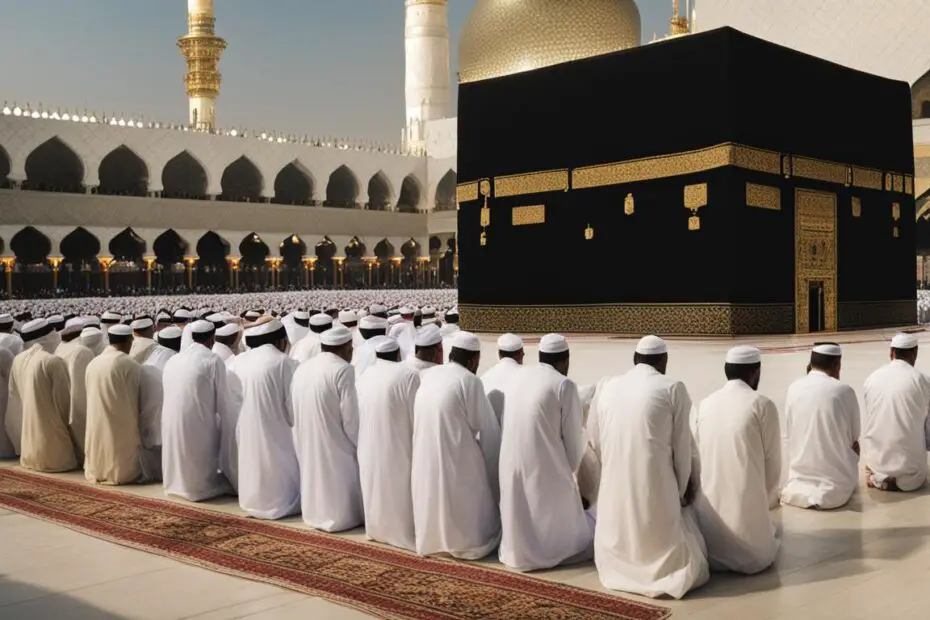
Welcome to our comprehensive guide on how to pray Jummah , the congregational Friday prayer in Islam . In this step-by-step guide, we will walk you through the rituals and etiquettes of Jummah prayer , ensuring that you have a thorough understanding of this important pillar of Islam. Whether you are a beginner or seeking to enhance your experience, this guide is designed to help you master the rituals and make the most out of your Jummah prayer .
Key Takeaways:
- Mastering the rituals of Jummah prayer is crucial for Muslim individuals.
- Jummah prayer holds great significance in Islam and is considered a fundamental pillar.
- Understanding the timings and etiquette of Jummah prayer is essential.
- Following a step-by-step guide can help ensure the proper observance of Jummah prayer.
- Jummah prayer offers numerous spiritual benefits and strengthens community unity.
The Importance of Jummah Prayer in Islam
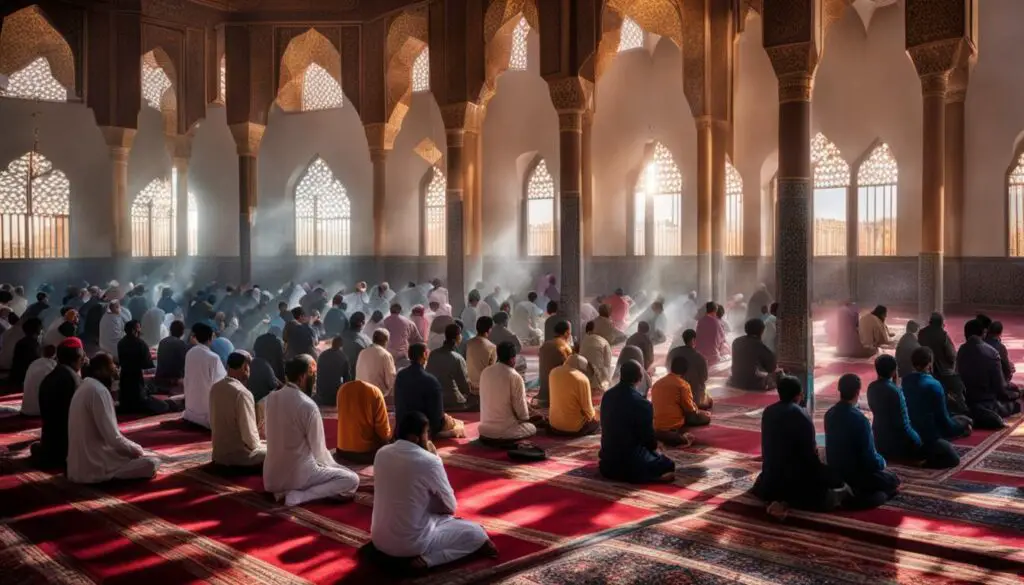
Jummah prayer is of significant importance in the religion of Islam. It is considered one of the fundamental pillars, which makes it obligatory for all Muslim individuals. The obligation of Jummah prayer was revealed directly to the Prophet Muhammad during his ascension to the heavens. It holds such great significance that it was the first act of worship made obligatory by Allah.
Jummah prayer is not only an act of worship but also a means of gaining success in both this world and the hereafter. It is the first action that a believer will be questioned about on the Day of Judgment. The performance of Jummah prayer demonstrates a person’s commitment to their faith, their desire for spiritual growth , and their willingness to gather with other members of the Muslim community.
The obligation to perform Jummah prayer is clear in the Quran , where Allah says, “O you who have believed, when [the adhan] is called for the prayer on the day of Jumu’ah [Friday], then proceed to the remembrance of Allah and leave trade. That is better for you, if you only knew” (Surah Al-Jumu’ah, Verse 9).
Attending Jummah prayer not only fulfills one’s religious duty but also offers various benefits. It provides an opportunity for Muslims to seek forgiveness, guidance, and blessings from Allah. Jummah prayer also strengthens the unity and brotherhood/sisterhood within the Muslim community. It allows individuals to come together, support one another, and learn from the teachings and reminders shared during the khutbah (sermon) delivered by the imam.
The Rituals of Jummah Prayer
Jummah prayer, also known as Friday prayer, is a sacred ritual in Islam that holds great significance for Muslims around the world. The proper observance of Jummah prayer involves specific rituals and etiquettes that must be followed. These rituals ensure a meaningful and spiritually uplifting experience for individuals attending the congregational prayer.
Performing Ablution (Wudu)
Before engaging in Jummah prayer, it is essential to perform ablution (wudu) to purify oneself. This involves washing the hands, mouth, nose, face, arms, and feet in a specific manner as prescribed in Islamic teachings. Ablution not only cleanses the physical body but also symbolizes the spiritual purity required for engaging in worship.
Attending the Mosque
It is customary for Muslims to attend the mosque for Jummah prayer. Gathering in the mosque allows individuals to collectively worship and seek blessings from Allah. It is important to arrive early to secure a place in the prayer hall and to ensure a calm and focused atmosphere during the khutbah (sermon) delivery.
Listening to the Khutbah
During Jummah prayer, the imam delivers a khutbah, which is a sermon that addresses various aspects of Islamic teachings, guidance, and reminders for the community. It is essential for attendees to listen attentively and respectfully to the khutbah, as it provides spiritual nourishment and serves as a source of knowledge and inspiration.
Offering the Prayer
After the khutbah, the congregation proceeds to offer the two units of prayer that make up Jummah prayer. The prayer consists of specific recitations and physical movements that are performed in congregation under the leadership of the imam. It is important to maintain a focused and respectful demeanor throughout the prayer, following the lead of the imam.
The Timings of Jummah Prayer
Jummah prayer, also known as Friday prayer, holds a special place in the Islamic faith. It is observed every Friday and has specific timings that Muslim individuals need to be aware of. Jummah prayer takes place in the afternoon, after the sun has passed its zenith and before the time of Asr prayer. The exact timings may vary depending on the location and season.
Being aware of the designated Jummah prayer timings is crucial to ensure that one can participate in the congregational prayer. It is recommended to arrive at the mosque a few minutes before the designated time to allow for proper preparation and joining the congregation. This not only enables individuals to fulfill their religious obligations but also provides an opportunity to connect with the community.
Attending Jummah prayer not only serves as a means of spiritual growth but also promotes unity and solidarity within the Muslim community. It is a time when individuals gather together to seek the blessings and guidance of Allah, engage in worship, and listen to the inspiring khutbah (sermon) delivered by the imam.
By understanding and adhering to the timings of Jummah prayer, individuals can ensure that they actively participate in this significant act of worship, fostering a deeper connection with their faith and strengthening their relationship with Allah.

The Khutbah (Sermon) of Jummah Prayer
The khutbah, or sermon, is an integral part of the Jummah prayer. It is delivered by the imam before the congregational prayer begins. The khutbah consists of two parts, with a brief sitting in between. During the khutbah, the imam addresses the congregation and delivers a speech covering various topics related to Islam, guidance, and reminders for the community. It is important for attendees to listen attentively to the khutbah and to follow any instructions or guidelines provided by the imam.
The khutbah holds immense significance as it provides an opportunity for Muslims to gain knowledge, seek spiritual guidance, and reflect on their faith. The imam may discuss religious teachings, share stories from the life of Prophet Muhammad, offer advice on personal or community matters, or provide reminders about the importance of good deeds and virtues. The khutbah serves as a means of collective education, fostering unity, and strengthening the bond within the Muslim community.
Listening to the khutbah is considered a form of worship, and it is essential for attendees to maintain a respectful and attentive demeanor throughout the sermon. This involves refraining from talking, engaging in any distractions, or using electronic devices. By actively listening and internalizing the message of the khutbah, individuals can derive spiritual benefits, gain insights, and be inspired to improve their lives in accordance with Islamic teachings.
The Significance of the Khutbah
The khutbah holds immense significance in the life of a Muslim. It serves as a source of knowledge, guidance, and inspiration. By listening attentively to the khutbah, individuals have the opportunity to deepen their understanding of Islam, gain practical advice for their daily lives, and strengthen their connection with Allah. The khutbah also allows for communal bonding and unity, as Muslims come together to listen and reflect on the shared message delivered by the imam.
Etiquettes of Listening to the Khutbah
When listening to the khutbah, it is important to observe certain etiquettes. This includes being present on time, avoiding unnecessary distractions, and maintaining a respectful and focused attitude. Muslims should refrain from engaging in conversations, using electronic devices, or engaging in any behavior that may cause disturbance. By adhering to these etiquettes, individuals can fully benefit from the spiritual and educational experience of the khutbah.
Step-by-Step Guide to Jummah Prayer
Mastering the rituals of Jummah prayer is essential for Muslim individuals who want to observe this important act of worship effectively. To help you navigate through the prayer with ease, here is a step-by-step guide:
Step 1: Perform Ablution (Wudu)
Before starting Jummah prayer, make sure to perform ablution (wudu) to purify yourself physically and spiritually. Begin by washing your hands, mouth, nose, face, arms, and feet, following the prescribed order and number of times.
Step 2: Attend the Mosque
Head to the mosque for the congregational prayer. It is recommended to arrive early to secure a spot and prepare yourself mentally for the prayer.
Step 3: Listen to the Khutbah
Listen attentively to the khutbah (sermon) delivered by the imam. The khutbah consists of two parts, with a brief sitting in between. It is important to remain quiet and respectful during the khutbah, paying attention to the guidance and reminders provided by the imam.
Step 4: Offer the Prayer
After the khutbah, the congregation will proceed to offer the Jummah prayer. It consists of two units (rak’ahs) with specific recitations and actions. Follow the imam’s lead and perform the prayer accordingly. Remember to maintain a focused and reverent demeanor throughout the prayer.
By following this step-by-step guide, you can confidently perform Jummah prayer and experience the spiritual benefits it offers.
The Significance of Jummah Prayer for Beginners
For beginners who are new to the rituals and etiquettes of Jummah prayer, it can sometimes be a daunting experience. However, it is important to understand the significance and benefits of Jummah prayer, especially for those starting their journey in Islam. Participating in Jummah prayer allows individuals to gather with the Muslim community, seek forgiveness, and strengthen their faith.
As a beginner, it is recommended to approach local mosques or Islamic centers for guidance and assistance in understanding the rituals and etiquettes of Jummah prayer. These institutions often offer classes or workshops specifically tailored for beginners, providing a supportive and educational environment.
Attending Jummah prayer not only fulfills a religious obligation but also provides a sense of unity and connection with the larger Muslim community. It is an opportunity to listen to inspiring khutbahs (sermons) delivered by knowledgeable imams, gain knowledge about Islam, and seek spiritual growth. Remember, everyone starts somewhere, and with time and practice, the rituals and etiquettes of Jummah prayer will become familiar and more comfortable.
Tips for Beginners Attending Jummah Prayer:
- Arrive early to secure a good spot and familiarize yourself with the environment.
- Listen attentively to the khutbah and take notes if needed.
- Observe the actions of others and follow along as best as you can.
- Don’t hesitate to ask questions or seek guidance from experienced community members.
- Stay focused and engage in the prayer, reflecting on its significance and seeking spiritual connection.
Remember, Jummah prayer is an opportunity to strengthen your relationship with Allah and the Muslim community. Embrace the journey of learning and growing, and don’t be discouraged by any initial challenges. With time and dedication, Jummah prayer will become a cherished and rewarding experience.
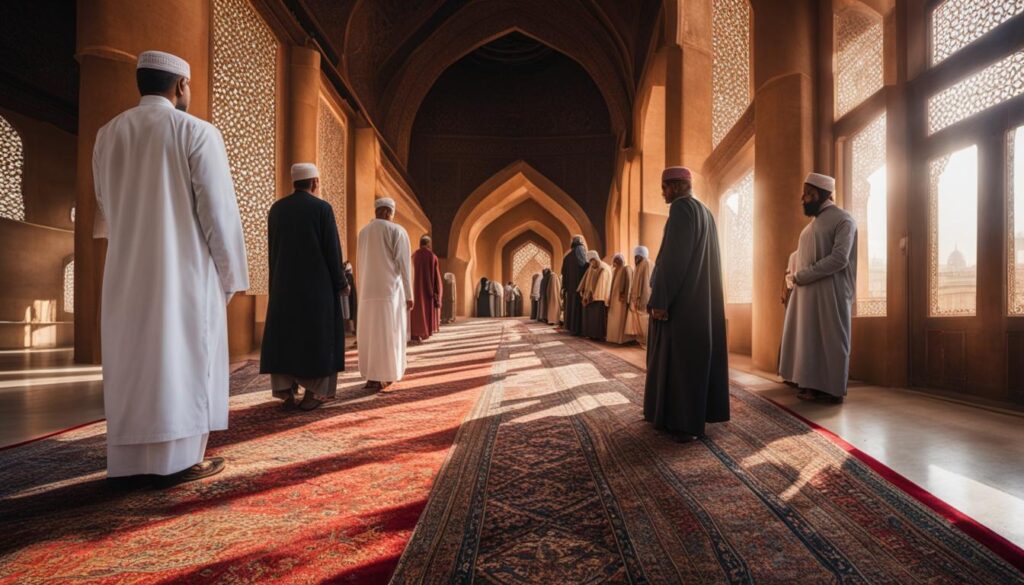
Importance of Purification and Cleanliness in Jummah Prayer
Purification and cleanliness play a significant role in Jummah prayer. It is essential to ensure that one has performed ablution (wudu) before engaging in the prayer. This includes washing the face, hands, and feet, and ensuring that one’s clothing and prayer area are free from impurities. Purification and cleanliness not only fulfill the physical requirements of Jummah prayer but also symbolize the spiritual purity and readiness to engage in worship.
In Islam, cleanliness is highly regarded and emphasized. The Prophet Muhammad (peace be upon him) said, “Cleanliness is half of faith.” This emphasizes the importance of purifying oneself before standing in prayer. Ablution not only physically cleanses the body but also purifies the soul, allowing individuals to approach prayer with a clear and focused mind.
Furthermore, maintaining cleanliness in one’s surroundings, such as the mosque or prayer area, is also essential. This ensures a conducive environment for worship and promotes a sense of reverence and tranquility during Jummah prayer. It is recommended to keep the prayer area tidy, free from any distractions, and to avoid wearing clothes with offensive odors or inappropriate slogans.
By upholding the principles of purification and cleanliness in Jummah prayer, individuals can enhance their spiritual experience and achieve a deeper connection with Allah. It is a way to demonstrate respect and devotion to the act of worship, and it serves as a reminder of the importance of maintaining cleanliness in all aspects of life.

The Obligations and Sunnahs of Jummah Prayer
When performing Jummah prayer, there are certain obligations and sunnahs that individuals should be aware of. Obligations are actions that must be fulfilled in order for the prayer to be valid, while sunnahs are recommended acts that can earn additional rewards. Understanding and practicing these obligations and sunnahs can enhance the spiritual experience of Jummah prayer.
Obligations of Jummah Prayer
The obligations of Jummah prayer include:
- Attending the congregational prayer: It is necessary to join the congregation at the mosque for Jummah prayer. Praying individually at home is not considered a substitute for the congregational prayer.
- Listening to the khutbah: The khutbah, or sermon, is an integral part of Jummah prayer. It is obligatory for attendees to listen attentively to the khutbah delivered by the imam.
- Offering the two units of prayer: Jummah prayer consists of two units of prayer, which must be performed after the khutbah. It is essential to offer these two units of prayer in order to fulfill the obligations of Jummah.
Sunnahs of Jummah Prayer
In addition to the obligations, there are sunnahs that can enhance the reward and experience of Jummah prayer:
- Performing ablution (wudu) before attending the prayer: Although ablution is not obligatory specifically for Jummah prayer, performing it before attending the prayer is a recommended act.
- Wearing clean and modest clothing: It is encouraged to dress in clean and presentable attire for Jummah prayer, showing respect and reverence for the occasion.
- Reciting Surah Al-Kahf: It is a sunnah to recite Surah Al-Kahf on Fridays, either before or after Jummah prayer, as it carries immense blessings and rewards.
By fulfilling the obligations and practicing the sunnahs of Jummah prayer, individuals can maximize the benefits and rewards of this important congregational prayer. It is a time to gather with the Muslim community, seek forgiveness, and strengthen one’s faith. Embracing these obligations and sunnahs can lead to a deeper connection with Allah and a more fulfilling worship experience.
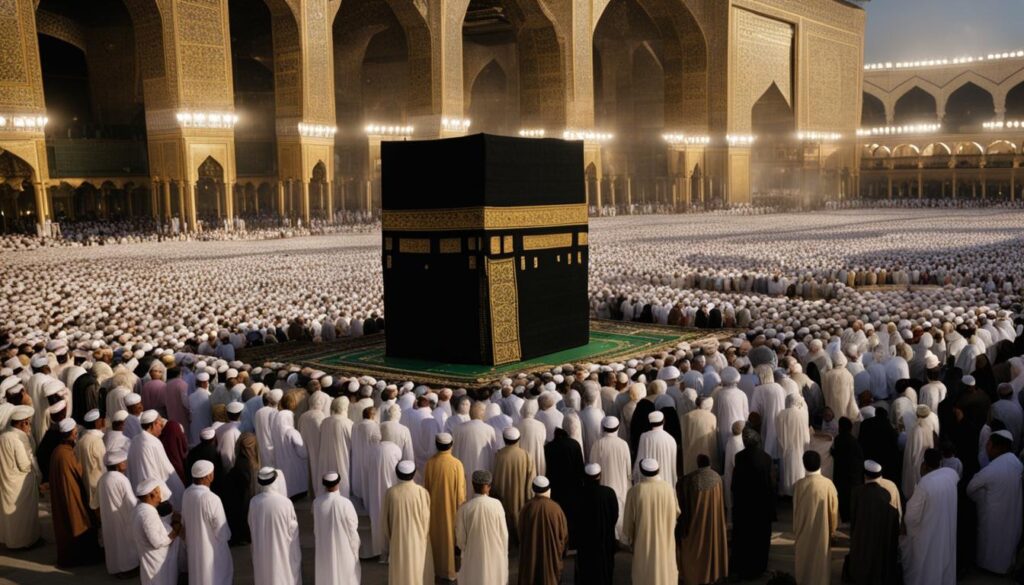
The Role of the Imam in Jummah Prayer
In Jummah prayer, the imam plays a pivotal role in leading the congregational prayer and delivering the khutbah. The imam is responsible for guiding and leading the attendees throughout the various stages of the prayer, ensuring that the actions and recitations are performed correctly. They recite the necessary Quranic verses and lead the congregation in unity and synchronization. The imam’s role is not only limited to prayer; they also serve as a spiritual leader and guide for the community.
During the khutbah, the imam delivers a speech that addresses the needs and concerns of the Muslim community. They provide religious knowledge, guidance, and reminders, covering a range of topics relevant to the community’s well-being and spiritual growth. The imam’s words carry significant weight and influence, as they have the power to inspire, educate, and motivate attendees to strengthen their faith and connection with Allah.
The imam also serves as an exemplar of good character and behavior. They demonstrate humility, integrity, and compassion, setting an example for the congregation to follow. They actively engage with the community, providing support, counseling, and guidance when needed. The imam’s role extends beyond the confines of the mosque, as they act as a representative of the Muslim community, fostering positive relationships and promoting understanding and harmony among different faiths and cultures.
In summary, the imam holds a significant role in Jummah prayer. They lead the congregation in prayer, deliver insightful khutbahs, and serve as a spiritual guide for the community. Their influence and guidance help individuals connect with Allah and strengthen their faith, promoting unity, and providing support to the Muslim community.
Tips for Enhancing the Experience of Jummah Prayer
To make the most out of your Jummah prayer experience, here are some helpful tips that can help you enhance your worship and spiritual connection:

1. Arrive early:
Coming to the mosque early allows you to secure a good spot for prayer. It also gives you time to settle in, mentally prepare yourself, and engage in supplications (dua) before the congregational prayer begins. Arriving early also demonstrates respect for the sanctity of the mosque and allows you to avoid any potential distractions.
2. Listen attentively to the khutbah:
During the khutbah (sermon), it is important to remain focused and listen attentively to the imam. The khutbah is an opportunity to gain valuable knowledge, guidance, and reminders about Islam. Paying attention to the khutbah allows you to reflect on its message and apply it to your daily life. Avoid distractions, such as talking or using electronic devices, and maintain a respectful demeanor throughout the sermon.
3. Focus on the meaning:
While performing the Jummah prayer, try to concentrate on the meaning behind the words and actions. Reflect on the praises and supplications you recite, understanding their significance and relevance to your life. This will help deepen your spiritual connection with Allah and strengthen your faith.
4. Participate actively:
Engage fully in the congregational prayer by following the imam’s lead and synchronizing your movements with the rest of the worshippers. Pay attention to the recitation of the Quran and join in the congregation’s responses, such as saying “Ameen” and “Allahu Akbar.” Actively participating in the prayer will further enhance your sense of unity and community with fellow Muslims.
5. Engage in supplication (dua):
Before and after the Jummah prayer, take the time to engage in personal supplication (dua) to seek forgiveness, guidance, and blessings from Allah. Use this moment to connect with your Creator on a deeper level and express your gratitude and needs. It is a powerful opportunity to strengthen your relationship with Allah and seek His mercy.
By implementing these tips, you can enhance your experience of Jummah prayer and cultivate a more meaningful connection with Allah and the Muslim community. Remember, Jummah prayer is not just a weekly obligation, but also an opportunity for spiritual growth and reflection.
In conclusion, Jummah prayer is a fundamental aspect of Islam and holds great significance for Muslim individuals. By understanding and adhering to the rituals and etiquettes of Jummah prayer, individuals can experience spiritual growth and strengthen their connection with Allah.
Participating in the congregational prayer and listening attentively to the khutbah delivered by the imam are important obligations of Jummah prayer. Additionally, observing the proper timings, maintaining purification and cleanliness, and actively engaging in supplication can enhance the experience of Jummah prayer.
It is crucial for beginners to seek guidance and assistance in understanding the rituals and etiquettes of Jummah prayer. Through participation in Jummah prayer, individuals can gather with the Muslim community, seek forgiveness, and deepen their faith.
Overall, Jummah prayer provides a unique opportunity for reflection, worship, and community unity. By continuously seeking knowledge and striving for excellence in worship, individuals can fully embrace the benefits and rewards of Jummah prayer.
What is the significance of Jummah prayer in Islam?
Jummah prayer is considered one of the fundamental pillars of Islam and holds great importance in the religion. It was the first act of worship made obligatory by Allah and is seen as a key to success in this world and the hereafter.
What are the rituals of Jummah prayer?
The rituals of Jummah prayer include performing ablution (wudu), going to the mosque for the congregational prayer, listening to the khutbah (sermon), and offering the two units of prayer. It is important to observe proper etiquette during Jummah prayer.
When is Jummah prayer performed?
Jummah prayer takes place on Fridays in the afternoon, after the sun has passed its zenith and before the time of Asr prayer. The exact timings may vary depending on the location and season.
What is the khutbah of Jummah prayer?
The khutbah is a sermon delivered by the imam before the congregational prayer begins. It consists of two parts and covers various topics related to Islam, guidance, and reminders for the community.
Can you provide a step-by-step guide to Jummah prayer?
A step-by-step guide to Jummah prayer includes performing ablution (wudu), going to the mosque, listening to the khutbah, and offering the two units of prayer. Following this guide will help ensure the proper observance of Jummah prayer.
How can beginners approach Jummah prayer?
Beginners can approach Jummah prayer by seeking guidance and assistance from local mosques or Islamic centers. It is important for beginners to understand the rituals and etiquettes of Jummah prayer to fully participate and benefit from the congregational prayer.
Why is purification and cleanliness important in Jummah prayer?
Purification and cleanliness are essential in Jummah prayer as they fulfill the physical requirements of the prayer and symbolize spiritual purity. It is necessary to perform ablution (wudu) and ensure that clothing and the prayer area are free from impurities.
What are the obligations and sunnahs of Jummah prayer?
The obligations of Jummah prayer include attending the congregational prayer, listening to the khutbah, and offering the two units of prayer. Sunnahs are recommended acts that can be voluntarily performed to earn additional rewards.
What is the role of the imam in Jummah prayer?
The imam plays a crucial role in leading the congregational prayer and delivering the khutbah. The imam is responsible for reciting Quranic verses and leading the congregation in the actions and recitations of the prayer.
How can the experience of Jummah prayer be enhanced?
The experience of Jummah prayer can be enhanced by coming to the mosque early, listening attentively to the khutbah, focusing on the meaning of the prayers and recitations, and actively participating in the congregational prayer. Engaging in supplication (dua) before and after the prayer is also recommended.
Source Links
- https://www.tenfold.ngo/wp-content/uploads/2019/06/TF-A5SalahBooklet-R3a-1.pdf
- https://submission.org/friday_congregational_prayer.html
- https://seekersguidance.org/articles/general-artices/practical-guide-friday-sermons/

Father / Grandfather / Minister / Missionary / Deacon / Elder / Author / Digital Missionary / Foster Parents / Welcome to our Family
View all posts
Related Posts:

how many rakats in jummah prayer? (sunnah prayer Before and After jummah)
Posted by Ahmed Abdulla | Prayer
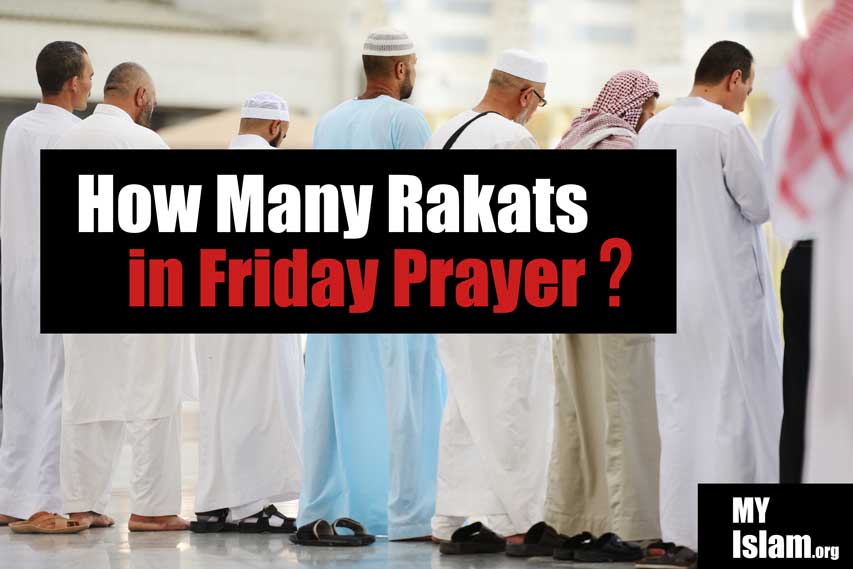
The number of rakats will depend on which school of fiqh you follow.
A reader not familiar with fiqh may be confused by other schools of fiqh. Which is right or wrong? Which should I follow?
This is not a matter of correctness but a matter of preference. A follower of one fiqh should not criticize or look down on the follower of another.
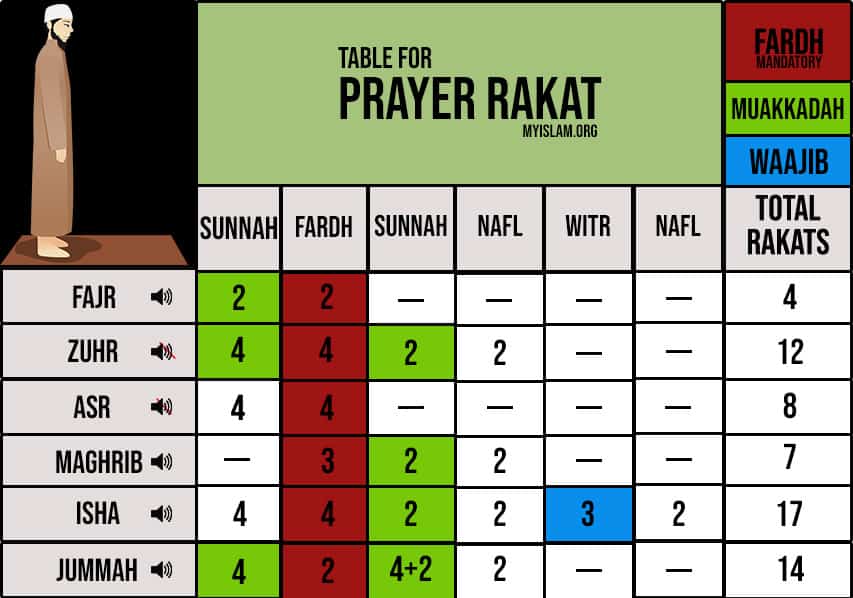
Number of Sunnah Rakat Before Jummah
The Sunnah of Prophet Muhammad (ﷺ) before Jummah was to pray 4 sunnah ghair muakkadah. Next would be 2 fardh (prayed in congregation), followed by 4 Sunnah muakkadah, 2 Sunnah muakkadah, and then 2 nafl.
In total there would be 14 rakats for Friday prayer.
For those unfamiliar, ghair mu’akkadah means salat which were sometimes performed by the Prophet, may peace be upon him, but sometimes it was abandoned.
Sunnah mu’akkadah is voluntary act of worship (praying Eid prayer or 2 Sunnah rakat of Maghrib). These the Prophet prayed regularly and made a point to never abandon. So although it is not mandated, a person who intentionally skips them is considered blameworthy.
Hadith on Jummah Rakat
Here’s the hadith which mention the number of rakats the Prophet used to pray for Jummah salat.
1. Abu Hurairah narrated that: Allah’s Messenger said: “Whoever among you is to pray after the Friday prayer, then let him pray four.” Grade: Sahih (Darussalam) Reference: At-Tirmidhi 523
2. Narrated Abd Allah b. Shaqiq: I asked A’ishah about the voluntary prayers offered by the Messenger of Allah (ﷺ). She replied: Before the noon prayer he would pray four rak’ahs in my house, then go out and lead the people in prayer, then return to my house and pray two rak’ahs. Grade: Sahih (Al-Albani) Reference: Sunan Abi Dawud 1251
3. Abdullah b. ‘Umar, while describing the Nafl prayer of the Messenger of Allah (ﷺ), said: He did not observe (Nafl) prayer after Jumu’a till he went back and observed two rak’ahs in his house. Yahya said: I guess that I uttered these words (before Imam Malik) that he of course observed (them). Reference: Sahih Muslim 882 b
From the combination of these hadiths we can see where the four rak’ah before Jummah prayer comes from, the 4+2 Sunnah mu’akkadah after prayer and then the 2 Nafl.
If any of us had made an unintentional mistake, may Allah forgive us.
Related Posts
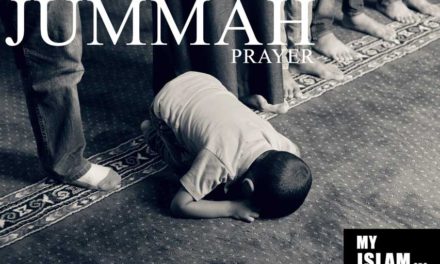
The Dangers of Missing Three Consecutive jummah According to Hadith
March 31, 2020
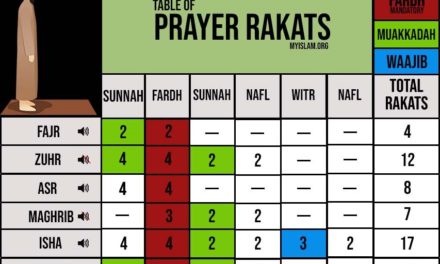
What are twelve Rakat Sunan Al Rawatib? (Sunnah Mu’akkadah Prayers)
May 5, 2020

Blessings and importance of Jummah Prayer
March 28, 2020

How To Pray Witr Salah
March 30, 2020
The Prophet (ﷺ) said, “He who removes from a believer one of his difficulties of this world, Allah will remove one of his troubles on the Day of Resurrection; and he who finds relief for a hard-pressed person, Allah will make things easy for him on the Day of Resurrection;
Leave a reply Cancel reply
Your email address will not be published. Required fields are marked *
Support the site?
“Take on only as much as you can do of good deeds, for the best of deeds is that which is done consistently, even if it is little.” – Sunan Ibn Majah 4240
Need more info? Read our 2023 Annual Report
- Albalagh.net
- AnswersToFatawa
- Arij Canada
- Askimam.org
- Askmufti.co.za
- AskOurImam.com
- CouncilofUlama.co.za
- Darulfiqh.com
- Darulifta Azaadville
- Darulifta Deoband Waqf
- Darulifta-Deoband.com
- Daruliftaa.com
- DaruliftaaMW.com
- DaruliftaaZambia.com
- DarulIftaBirmingham
- Darulihsan.com
- DarulUloomTT.net
- Fatwa-TT.com
- Fatwa.org.au
- FatwaCentre.org
- HadithAnswers.com
- IslamicPortal.co.uk
- IslamicSolutions.org
- Jamia Binoria
- Mahmoodiyah
- Mathabah.org
- Muftionline.co.za
- Muftisays.com
- MuslimaCoaching.com
- Seekersguidance.org
- ShariahBoard.org
- Tafseer Raheemi
- TheMufti.com
- ZamzamAcademy.com
- BinBayyah.net
- Darul Iftaa Jordan
- Shafiifiqh.com
- HanbaliDisciples.com
- TheHanbaliMadhhab.com
- Ask Question
- Lailatul Qadr

Home » Hanafi Fiqh » DarulIftaBirmingham » Travelling on Friday
Related Q&A
- Traveling on Friday: Disliked or Not?
- Is Jummah salah obligatory in this situation
- Traveling on Friday
- Missing Jummah Salah due to working in restaurants?
- Is the Friday Prayer an Individual Obligation or a Communal Obligation?
- A person finds the last part of the khutbah
Travelling on Friday
Can I travel on Friday if I am to miss Friday prayers because of train timing?
The following conditions must be met in order for Jummah Salah to be obligatory:
- To be within the boundary of a town (Muqeem)
- To be healthy (physically able to perform Salah)
- The road should be safe
- Not to be physically handicapped. (Kitabul Fiqh p.603 v.1)
The following conditions are necessary for the Jummah Salah to be correct:
- A large town
- Time of Zuhr prayer
- The Khutbah
- Congregation
There are three people besides the Imam (four Muslims) at your workplace which will constitute the congregation. The presence of females or minors only is not enough. (Raddul Muhtar p.24 v.3)
- Izn Aaam (general call for the prayer)
It is permissible to undertake a journey before the beginning the Zuhr prayer (Zawaal) on Friday. However, it is Makruh Tahreemi to undertake a journey after Zawaal on a Friday without performing the Jummah Salah as Jummah Salah is obligatory upon a Muqeem (resident of a town).

Only Allah Knows Best
Mohammed Tosir Miah
Darul Ifta Birmingham
This answer was collected from DarulIftaBirmingham.co.uk , which is run under the supervision of Mufti Mohammed Tosir Miah from the United Kingdom.
Read answers with similar topics:
Random Q&A
Could you please explain the istikhara dream and the meaning of the name to me, can a woman with afro-textured hair straighten her hair will it be considered “alteration of allah’s creation”, group travel for women: imam shafiee vs hanafi fiqh, does birth or death negate sanctity of a place, even if body brought home from hospital, a convert sister left an abusive relationship and has had false rumours spread about her. what can i do to help, more answers….
- Doubts and Purification
- If someone is refusing to pay his debt
- An Islamic Organization Has Bought an Islamic Center With a Credit Union Whose Main Business Is Interest-Based Loans
- Is Zakat Obligatory on IRA/Retirement Accounts That You Don’t Have Access to Until You Reach a Specific Age
- Can a woman remove her niqab or hijab in front of her father in law?
- Receiving Interest from a Welfare Trust
Latest Q&A
- Is Makeup Allowed During Iḥrām?
- Do These Actions Formulate Disbelief?
- The Status of a Job Acquired with False Certification
- Can a Ḥanafī Resident Pray Behind a Shāfi’īe Traveller?
- Is it Permissible to Allow Wheelchairs in a Masjid?
- Is an Entry Fee at a Charity Event Considered Charity?
Indexed Websites
Privacy overview.
- Islamic History
- Islamic Story
- Muslim Personalities
- Prayer and Worship
- Spirituality
Ruling On Jumuah (Friday) Prayers While Travelling

Praise be to Allaah.
Salaat al-Jumu’ah (Friday prayer) is not obligatory on the traveller. This is the opinion of the majority of scholars, including the followers of the four schools of Abu Haneefah, Maalik, al-Shaafa’i and Ahmad.
Shaykh al-Islam Ibn Taymiyah (may Allaah have mercy on him) said in al-Fataawa (24/178): “The correct opinion, without a doubt… is that this (Jumu’ah and Eid prayers) are not obligatory for the traveller. The Messenger of Allaah (peace and blessings of Allaah be upon him) used to travel frequently: he performed ‘Umrah three times, besides the ‘Umrah he performed along with Hajj. He performed his Farewell Pilgrimage accompanied by thousands upon thousands of people, and he went on more than twenty military campaigns, but there are no reports at all that say he prayed Jumu’ah or Eid prayers when travelling; he just prayed two rak’ahs [i.e., shortened prayers] as on all the other days. There are also no reports that say he preached a khutbah on a Friday when he was travelling, neither standing on his own two feet or from atop his camel, as he used to do on Eid, or from a minbar, as he used to do on Fridays. He occasionally used to deliver an address to the people when he was travelling, and this was narrated by them… but no-one reported that he delivered a khutbah to them before prayer on a Friday whilst travelling, and no-one reported that he recited Qur’aan aloud on a Friday (i.e., during Salat al-Zuhr, on a journey). Of course, if he had done something out of the ordinary and recited aloud or delivered a khutbah, they would have reported it. On the Day of ‘Arafaah, he delivered a khutbah, then he came down and led them in a two-rak’ah prayer, but no one reported that he recited aloud in that prayer. That khutbah was not for Jumu’ah – because if it had been for Jumu’ah, he would have done the same (delivered a khutbah) on every other Friday (when he was travelling); that khutbah was given because it was part of the rituals (of Hajj). Hence all the Muslim scholars said that he would have given a khutbah at ‘Arafaah even if it had not been a Friday. This mutawaatir report proves that it was a khutbah for the Day of ‘Arafaah, not for Friday.”
From the above we know that Jumu’ah is not obligatory for the traveller, all that he has to do is to pray Zuhr. However, if he prays Jumu’ah with the people of the place he is visiting, this is OK. It says in al-Sharh al-Kabeer (2/154): “Whoever of these people – travellers, slaves and women – attends Jumu’ah, does not have to pray Zuhr, and we know of no dispute on this point.
Their exemption from having to attend Jumu’ah is to make things easy for them, but if they attend, it is OK, as is the case with the sick person. It is preferable for the traveller to attend Jumu’ah, because this is better, and is on the safe side (because some scholars think that Jumu’ah is obligatory for the traveller who is staying in a particular place, but not for the traveller who is on the road), as he comes under the general meaning of the aayah (interpretation of the meaning): “O you who believe! When the call is proclaimed for the Salaah on the Day of Friday (Jumu’ah prayer), come to the remembrance of Allaah, and leave off business (and every other thing), that is better for you, if you did but know!” [al-Jumu’ah 62:9].
We have already stated that the majority of scholars say that generally speaking it is not obligatory. And Allaah knows best.
Islam Q&A Sheikh Muhammed Salih Al-Munajjid
image source
You Might Also Like

Stunning night-time shots of Muslims in Hajj

Mercy: First 10 days of Ramadan
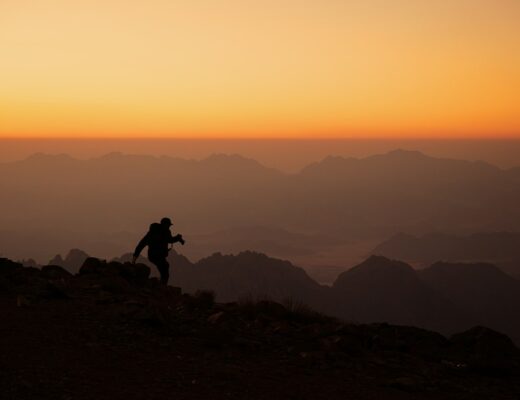
How to give Adhan for Fajr prayer
No comments, leave a reply cancel reply.
Save my name, email, and website in this browser for the next time I comment.
- Give Your Zakat

Can We Combine the Friday and Asr Prayers When Travelling? (Shafi’i)
Answered by Shaykh Abdurragmaan Khan
Question: Assalam alaykum,
Can we combine the Friday and Asr prayers when travelling?
Answer: Wa alaykum al-Salam
Shukran for your question.
Joining between prayers is not permitted in the Hanafi school. The remaining three madhahib, however, all permit joining between prayers (dhur and Asr, Magrib and Isha) when certain conditions are met. Similar to dhur salah would be the Jumu’ah prayer in this regard. Accordingly, you may join between Asr and Jumu’ah according the three schools of thought, viz the Maliki, Shafi’i and Hanbali schools.
Note that in the case of jumu’ah, Asr will have to be brought forward and jumu’ah may not be delayed to the Asr time of prayer. If one wishes to delay jumu’ah to the the Asr time of prayer, it will be considered dhur Salah and not jumu’ah, keeping in mind that jumu’ah is not compulsory upon the traveler.
And Allah knows best Wassalam [Shaykh] Abdurragmaan Khan Shaykh Abdurragmaan received ijazah ’ammah from various luminaries, including but not restricted to: Habib Umar ibn Hafiz—a personality who affected him greatly and who has changed his relationship with Allah, Maulana Yusuf Karaan—the former Mufti of Cape Town; Habib ‘Ali al-Mashhur—the current Mufti of Tarim; Habib ‘Umar al-Jaylani—the Shafi‘i Mufti of Makkah; Sayyid Ahmad bin Abi Bakr al-Hibshi; Habib Kadhim as-Saqqaf; Shaykh Mahmud Sa’id Mamduh; Maulana Abdul Hafiz al-Makki; Shaykh Ala ad-Din al-Afghani; Maulana Fazlur Rahman al-Azami and Shaykh Yahya al-Gawthani amongst others.
Related Posts
Does the shafi‘i school hold that a man can marry his illegitimate biological daughter, what are the things that require ghusl (ritual bath), if i immediately covered my awra, is my prayer valid, can men wear gold-coloured jackets.
Accessible to all, supported by you
Learn With Us
- Course Catalog
- Live Schedule
- Student Login
Seek With Us
- Ask a Question
Get to Know Us
- Our Reports
- Privacy Policy
Get Free Courses & Prophetic Guidance in Your Inbox
Email Address *

Muezzin of Masjid al-Haram Sheikh Ahmad Basnawi Hospitalized
Surah al-maun: full story and life lessons.

Pakistani Umrah Pilgrim Saved After Suffering Heart Attack In Grand Mosque

Bollywood Actress Lara Dutta Praises PM Modi’s Disrespectful Remarks About Muslims
- Zenubia Khan
- Zara Mohammed
10 Must Things To Do On Jummah (Friday Prayer)
Jummah is a congregational petition (ṣalāt) that Muslims hold each Friday, soon after twelve rather than the Zuhr petition. Muslims supplicate usually five times every day as per the sun’s skyway paying little mind to time zones.
Table of Contents
1. Cutting Nails
Abu Hurayrah (may Allah be satisfied with him) reported that ‘Five are the demonstrations of fitra (normal slant):
- Circumcision
- Evacuating the hair underneath the navel
- Trimming the mustache
- Trimming the nails
- Culling the hair under the arms.
2. Reading Surah Al-Kahf
It was described by Abu Sa’eed al-Khduri that the Prophet (Sallallahu ályhi Wa Sallam) said: “ Whoever reads Soorat al-Kahf on Friday, he will be illuminated with light between the two Fridays. ” (Narrated by al-Haakim; classed as Saheeh by al-Albaani)
3. Making Dua
Don’t MISS The Golden Opportunity !!
Ibn Al-Qayyim (Rahim Ullah) said with regards to the correct hour of Friday amid which happens is after the Asr petition until the Maghrib supplication in view of the accompanying hadith: “Friday has twelve hours (or part of it). There is one hour during which if a Muslim asks Allah anything, Allah will give it to him, so find it during the last hour after Asr.” {Abu Dawud & An-Nasai}
4. Taking Bath (Ghusl)
Washing up and refining oneself totally by watching Ghusl (great bathing). As described by Abdullah Canister Umar (R.A) said:
“I heard the Messenger of Allah, PBUH says: ‘When one of you wants to come to Jumu’ah, let him perform Ghusl.” (Muslim)
Along these lines, the considerable estimation of Friday is apparent from the previously mentioned Hadith, that other than general bathing, one likewise needs to do greater bathing while showering.
5. Wearing clean clothes, doing miswaak (brushing teeth) and applying perfume (nonalcoholic scent)
Keep in mind that day you had that huge occasion and you invested hours in the restroom cleaning all aspects of your body and putting each kind of scent on. That is precisely how you ought to get ready for Jumuah! Wash up, ensure you play out the Sunan Al-Fitra from trimming nails, expelling hair from armpits and evacuating pubic hair, putting heaps of scent, and so on.
Ensure your Jumuah thobe or garments are perfect, spotless, and squeezed and not something you wore 2 days prior and is recolored or folded! Additionally, take extraordinary care of oral cleanliness: spend the suggested 4 minutes brushing your teeth, utilize liquor-free mouthwash, miswak/siwak… fundamentally, get squeaky clean!
6. Going Mosque Early
No, I don’t mean 10 minutes before the Khateeb enters the masjid, yet truly early – like two or three hours and attempt to go there strolling rather if the masjid isn’t too far. Attempt to be the first there and recollect this hadeeth:
Described Abu Hurairah: Allah’s Messenger (Peace and endowments be upon him) said,’ When it is Jumuah, the Angels stand at the gate of the masjid and keep on writing the names of the persons coming to the masjid in succession according to their arrivals.
The example of the one who enters the masjid in the earliest hour is that of one offering a camel (in sacrifice); the one coming next is like one offering a cow, and then a ram; and then a chicken; and then an egg respectively. When the Imam comes out (for Jumu’ah sermon) they (i.e. Angels) fold their papers and listen to the sermon. [Translation of Sahih Al-Bukhari]”
7. Friday Prayer
8. sending a lot of blessings upon the prophet muhammad (pbuh).
It was narrated from Aws ibn Aws that the Prophet (peace and blessings of Allaah be upon him) said: “The best of your days is Friday. On that day Adam (peace be upon him) was created; on that day he died; on that day the Trumpet will be blown, and on that day all of the creation will swoon.So send a lot of blessings upon me, for your blessings will be shown to me.” They said, “O Messenger of Allaah, how will our blessings upon you be shown to you when you have turned to dust?” He said, “Allaah has forbidden the earth to consume the bodies of the Prophets, peace be upon them.”
Narrated by Abu Dawood, 1047; classed as Saheeh by Ibn al-Qayyim in his comments on Sunan Abi Dawood, 4/273; classed as Saheeh by al-Albaani in Saheeh Abi Dawood , 925.
9. Walking to the Mosque
Strolling towards the mosque, as it results in the achievement of gifts on one stage and the pardoning of sins on another. Abu Hurairah (R.A) portrayed Hazrat Muhammad (PBUH) talking as:
He who purifies (performs Wudu’) himself in his house and then walks to one of the houses of Allah (mosque) for performing an obligatory Salat, one step of his will wipe out his sins and another step will elevate his rank (in Jannah).” (Muslim)
10. Listening carefully to Jummah Khutba (Sermon)
“Whoever says to his friend while Imam is delivering Khutbah on Friday “keep quiet” also commit an absurdity.” (Muslim and Bukhari)
5 Women Rights Given By Islam Before Any Other Society
7 things that break wudu (ablution), related posts, russian astronaut shared makkah’s grand mosque images from space, 4 beautiful advantages you’ll experience when you start offering the fajr, significance of madinah: history, meaning and facts, cure of coronavirus in islam, according to hadiths.
- en العربية ar English en
What to Do If You Miss Jumu`ah Prayer
Publication : 22-05-2007
Views : 208912
If Jumu`ah prayer is missed at the Masjid, should it be prayed as Dhuhr or to be considered Jumu`ah? What is the ruling for men, women, slaves, and the traveller? What was Sheikh Nasir Al-Albany’s opinion about this matter?
Summary of answer
Contents Related
What to do if you miss Jumu`ah prayer?
The view of shaykh al-albani on what happens if you miss jumu’ah, is jumu`ah obligatory on women.
Praise be to Allah.
If a man does not attend Jumu`ah due to a legitimate excuse such as sickness and so on, or for some other reason, he should pray Dhuhr. Similarly a woman should pray Dhuhr. Travellers and desert dwellers should also pray Dhuhr, as is indicated by the Sunnah. During the Farewell Pilgrimage, when the Prophet (peace and blessings of Allah be upon him) stood at `Arafah on a Friday he led the people in praying Dhuhr and he did not lead them in praying Jumu`ah, because he did not order the people of the desert (people who live outside cities and towns) to pray Jumu`ah.
This is the view of the majority of scholars, and the view of those who held odd opinions should not be taken into account. The one who misses Jumu`ah deliberately also has to repent to Allah and offer it as Dhuhr prayer. (See Majmu` Fatawa wa Maqalat Mutanawwi’ah li Samahat Ash-Shaykh Ibn Baz (may Allah have mercy on him) (12/332).
As for the view of Shaykh Nasir Al-Albani (may Allah have mercy on him), it is in accordance with the view of the majority of scholars on this matter. In his essay Al-Ajwabah An-Nafi’ah (p. 47) he quotes the words of Siddiq Hasan Khan (may Allah have mercy on him): “Jumu`ah is an obligation that Allah, may He be Glorified and Exalted, has enjoined upon His slaves. If a person misses it for some reason, there should be evidence that Dhuhr prayer is required. The Hadith of Ibn Mas`ud, “If you miss the two Rak`ahs then you should pray four Rak`ahs” indicates that the one who misses Jumu`ah must pray Dhuhr.”
Then Al-Albani (may Allah have mercy on him) commented on these words by agreeing with them and classing the Hadith of Ibn Mas`ud (may Allah be pleased with him) as authentic. Among the things that he (may Allah have mercy on him) said was:
Perhaps the author quoted the Hadith of Ibn Mas`ud (may Allah be pleased with him) as evidence even though it is Mawquf because he did not know of anyone among the Companions who disagreed with that. It is supported by the meaning that is understood from the Hadith of Abu Hurayrah (may Allah be pleased with him): “Whoever catches up with one Rak`ah of Jumu`ah prayer has caught up with Jumu`ah.” It is also supported by the report narrated in Al-Musannaf (1/206/1) with an authentic Isnad (chain of narration) from `Abd Ar-Rahman ibn Abu Dhu’ayb who said: I went out with Az-Zubayr on a Friday and he prayed Jumu`ah with four Rak`ahs. This `Abd Ar-Rahman is the son of `Abdullah ibn Abu Dhu’ayb who was mentioned by Ibn Hibban in Ath-Thiqat (6/122/1) who said: He was an orphan who was under the care of Az-Zubayr ibn Al-`Awwam.
The Hadith of Ibn Mas`ud indicates that Dhuhr is the basic obligation, and that it is what is required of the one who does not pray Jumu`ah. This is supported by several things:
- It is well known that the Prophet (peace and blessings of Allah be upon him) and his companions used to pray Dhuhr on Fridays if they were travelling, but they would offer it in shortened form.
If the basic obligation on Friday was Jumu`ah prayer, they would have offered the two Rak`ahs as Jumu`ah.
- `Abdullah ibn Ma`dan narrated that his grandmother said: `Abdullah ibn Mas`ud said to us (women): When you pray with the Imam on Friday, pray as he prays, but if you pray in your houses, then pray four Rak`ahs.” (Narrated by Ibn Abu Shaybah, 1/207/2). Its Isnad going back to the grandmother of Ibn Ma`dan is authentic, but I do not know who she is. It seems that she was a Tabi`i woman, not one of the Companions, but (this report) is supported by what Al-Hasan said, that a woman who attends the mosque on a Friday should pray with the Imam, and that will be sufficient for her. Its Isnad is authentic in the report via Ash`ath from Al-Hasan who said: The women of the Muhajireen used to pray Jumu`ah with the Messenger of Allah (peace and blessings of Allah be upon him), and they regarded that as sufficient and did not think that they had to pray Dhuhr as well.
I said: The one who claims that the basic obligation on Friday is Jumu`ah prayer, and that the one who misses it or is not obliged to pray it, such as travellers and women, should pray two Rak`ahs of Jumu`ah, has gone against these texts with no evidence. Then I saw that As-San`ani (2/74) stated something similar and that if a person misses Jumu`ah he must pray Dhuhr according to scholarly consensus, and (Dhuhr) is a replacement for (Jumu`ah).”
Similarly, with regard to women, the scholars unanimously agreed that Jumu`ah prayer is not obligatory for women and that they may pray Dhuhr in their homes with four Rak`ahs on Fridays.
Ibn Al-Mundhir (may Allah have mercy on him) said in Al-Ijma` (no. 52): “They unanimously agreed that Jumu`ah is not obligatory for women .”
The evidence for that is the Hadith of Tariq ibn Shihab (may Allah be pleased with him), according to which the Prophet (peace and blessings of Allah be upon him) said: “Jumu`ah is a duty that is required of every Muslim in congregation except four: a slave, a woman , a child or a sick person.” (Narrated by Abu Dawud, 1067).
An-Nawawi (may Allah have mercy on him) said in Al-Majmu` (4/483): “Its Isnad is authentic according to the conditions of the two Shaykhs (Al-Bukhari and Muslim).”
Ibn Rajab (may Allah have mercy on him) said in Fath Al-Bari (5/327): “Its Isnad is authentic.” Ibn Kathir said in Irshad Al-Faqih (1/190): “Its Isnad is good.” It was also classed as authentic by Al-Albani in Sahih Al-Jami` (3111).
And Allah knows best.
Was this answer helpful? No Yes
Source: Islam Q&A
Similar Topics
Do You Have to Pray Jumu`ah while Travelling?
Minimum Number for Jumu`ah Prayer
Jumu’ah is obligatory for everyone in the city even if they do not hear the adhan
Do Women Pray Jumu`ah?
If a woman prays Zuhr on Friday, should she also pray the regular Sunnah prayers of Zuhr?
Ruling on a woman praying Jumu‘ah
share Question
You can ask your question on the website via this link: https://islamqa.info/en/ask
Log in Create an account
Password should contain small, capital letter and at least 8 characters long
Can't log in to your account?
If you do not have an account, you can click the button below to create one
If you have an account, log in
Create new account Log in
Reset Username or Password
Send feedback.
latest in US News
Massive fire breaks out on historic southern california pier.

Write-in votes exceed 60K in Pennsylvania Democratic primary...

Ex-teacher pleads no contest for sex with 14-year-old on his...

First cargo ship passes Baltimore Key bridge wreck via temporary...

UPenn swarmed by anti-Israel protesters who set up encampments on...

Student, 18, killed after being shot multiple times outside Texas...

Biden snarls traffic in Westchester for fundraiser at $4.5...

Baltimore HS athletic director used AI to make fake clip of...
Male bishop rips collar off female cleric for forgetting words to prayer — quickly called a misogynist but claims he was joking.
- View Author Archive
- Get author RSS feed
Thanks for contacting us. We've received your submission.
An LGBTQ+ friendly Easter vigil turned into momentary chaos when a prominent Episcopal bishop tore the collar off a female reverend who drew a momentary blank during the eucharistic prayer which was emceed by a drag queen.
Bishop Alan M. Gates is under fire for his caught-on-camera moment when he yanked the clerical collar from Rev. Tamara Tucker’s neck during the Great Vigil of Easter at The Cathedral Church of St. Paul in Boston on March 30.
Tucker is the priest and lead organizer of The Crossing, an emerging church worship community committed to radical welcome and a safe space for all, including the LGBTQ community.
The reverend was in the middle of instructing the congregation about the proper procedure of offering communion when she lost her train of thought.
Tucker’s gaffe was blamed on a recent absence of hers and led to Gates’ failed attempt at humor during the most sacred, intimate sacrament in many Christian churches.

“Very simply, we’re going to allow somebody to take their own piece of bread, the small piece of bread, and you will say to the person taking the bread,” Tucker says before pausing.
“Wait what is it, I’ve been gone for a while.”
“The Body of Christ,” Tucker exclaims.
The momentary pause drew laughter from everyone around the reverend including Gates.

“It’s very simple, the Body of Christ, that’s it, that’s all you got to do,” Tucker explains.
“And then when they take the cup, you’ll pass it to them the Love of Christ, or the Blood of Christ, whichever is more comfortable to you.”
“Can we do that? If I can do that after three months, I think we can.”
Without saying a word, Gates walks up to Tucker and yanks the white, plastic insert out of the reverend’s collar, to her dismay but the enjoyment of the rest of the church.
Start your day with all you need to know
Morning Report delivers the latest news, videos, photos and more.
Thanks for signing up!
Please provide a valid email address.
By clicking above you agree to the Terms of Use and Privacy Policy .
Never miss a story.
After a brief moment of thought, Gates returned the collar to Tucker telling her “just kidding,” and placing his hand on her shoulder.
People inside the cathedral didn’t see Gates’ actions on the altar as funny and even called out the bishop’s actions for revealing the misogyny that had plagued the church in the past.
“It was just really sad that an occasion that is supposed to be joyous had to be marked by the specter of long-term misogyny that is pretty essential to Christianity, even in a church that feels like it has advanced past that,” Rev. Rita Powell, the chaplain for the Harvard Episcopal Community, who attended the service told the Boston Globe.

”I know Bishop Gates didn’t think of it that way in his intention,” Powell said calling him a “good man.”
The representative for the diocese of which the cathedral is a member said the bishop’s actions came during a “light-hearted context of a non-traditional service, but it was ill-considered.”
“His sincere desire is to make apology and repair, and that is what he’s now working to do,” Tracy J. Sukraw, a spokesperson for the Episcopal Diocese of Massachusetts. told the newspaper.

Gates addressed the incident and apologized for his “misguided mischief,” two weeks after the vigil.
“Near the conclusion of the eucharistic prayer, at the altar, Rev. Tamra had a moment – familiar to every worship leader – in which she blanked on the next line,” the Bishop said in a statement shared by the Diocese.
“In an instant of altogether misguided mischief, I reached out and removed Rev. Tamra’s clerical collar. It was a devastating and demeaning act, which I regret with all my heart.”
Gates apologized to both Tucker and her worship community for disrespecting their pastor.
“By my action I misused my authority, failed to extend episcopal grace, and transgressed personal space and boundaries. I am deeply sorry.

“I extend my remorse and apology to the Rev. Tamra Tucker; to the Crossing community; to the Cathedral community; to other communities present; to ecumenical companions who had joined us at the Vigil; and to those in the wider church and community whom I have hurt.”
Tucker hadn’t responded to the newspaper’s request for comment, saying she wasn’t ready to address it.
Share this article:

Advertisement

IMAGES
COMMENTS
Is Jumu`ah while traveling obligatory? Salat al-Jumu`ah (Friday prayer) is not obligatory on the traveller. This is the opinion of the majority of scholars, including the followers of the four schools of Abu Hanifah, Malik, al-Shafi'i and Ahmad. Shaykh al-Islam Ibn Taymiyah (may Allah have mercy on him) said in al-Fatawa (24/178): "The ...
According to the view of scholars of Hanafi, it is makruh to leave the city until the Jummah prayer is performed after the first adhan of Friday is recited. But it is not makruh to leave the city before zawal. However it is always better for a Muslim to delay his travel until after praying the Friday prayer in order to avoid the difference of ...
Jummah, or Friday prayer, is the congregational prayer (Salah) that Muslims hold every Friday, just after noon, in the place of Dhuhr. It is considered one of the most important elements of the Islamic faith and has been ordained in the Qur'an. The Jummah prayer is an obligation that is required of all adult male Muslims and is to be performed ...
Jumu'ah prayer is waived for the traveller, so he should pray Zuhr, shortening it to two rak'ahs, and he may join it with 'Asr at the time of the earlier or later prayer, according to what he needs to do. But it is better not to join it unless he needs to do so, if it will be difficult for him to perform each prayer at its own time.
With regard to joining prayers , it is permissible for a traveller to join Zhuhr and 'Asr, and Maghrib and 'Isha, at the time of the earlier or later prayer, depending on what is easiest for him. But it is better for him not to do that unless it is difficult for him to offer every prayer on time. Based on that, you can join two prayers ...
It is Sunnah to perform ghusl (cleansing of the whole body) on Friday and to put on clean good clothes before attending the Jumu`ah Prayer. Men (but not women) should also apply perfume before attending the Prayer. The first thing to do in the mosque is to pray two rak`ahs of Sunnah Prayer, known as the tahiyyat or greeting of the mosque. Even if one arrives after the beginning of the sermon ...
Answer: Al-Salam `alaykum. Since your friend is travelling more than 77km* he is considered a musafir legal traveller. Thus Jumu`ah Salah will not be binding upon him and he will be allowed to offer Zhur instead. However if he is able to comfortably offer the Jumu`ah it is better for him not to miss this important weekly congregatory prayer.
2. Wearing Clean Clothes: Muslims are encouraged to wear clean and neat clothes to Friday prayer as a sign of respect for the occasion and devotion to Allah SWT. 3. Using Perfume: Using perfume or wearing a fragrance before attending Jumu'ah prayer improves personal hygiene and improves one's overall presentation.
Congregational prayer: Jumah prayer is a congregational prayer, and Muslims are encouraged to attend the mosque and pray together. The Prophet Muhammad (peace be upon him) said that Friday is the best day of the week and that there is a special blessing for those who attend the Jumuah prayer. Sermon and reminder: Jumah prayer includes a sermon ...
In a single year we are given the opportunity to preform fajr, zuhr, asr, maghrib and isha for a total of 1773 times. Each instance is a chance for us to grow closer to Allah subhanahu wa ta'ala. 1773 times to show our passion and love towards Islam and to remember him. In a single year we are just given 52 times to engage in the Jummah prayer.
Number of Rakats While Travelling: Fajr - 2 Fardh. Zuhr - 2 Fardh. Asr - 2 Fardh. Maghrib - 3 Fardh. Isha - 2 Fardh. With regards to the Sunnah and Nafl salat, the travellers had the choice as to whether or not this will be offered. It is advised once the traveller has settled that he should pray the Sunnah and Nafl prayers.
The hadeeth means: The Friday Prayer is not wãjib upon four types of people; the slave man, the woman, the sick, the young child, and it comes in another narration, " the traveler ". Shaykh Attiyyah Saalim rahimahullah explains the reasons being for each type here. Some scholars of the hanafiyyah add to the five types "the blind" which ...
Answer. In the name of Allah, the Inspirer of truth. The minimum distance of journey for a person to be deemed a traveller is 48 miles. When a person leaves their home city with an intention to travel this distance or further, they will be a considered a legal traveller, and thus it will be mandatory wajib for them to shorten their fard (obligatory) prayers as a concession.
The obligation to perform Jummah prayer is clear in the Quran, where Allah says, "O you who have believed, when [the adhan] is called for the prayer on the day of Jumu'ah [Friday], then proceed to the remembrance of Allah and leave trade.That is better for you, if you only knew" (Surah Al-Jumu'ah, Verse 9). Attending Jummah prayer not only fulfills one's religious duty but also ...
The Sunnah of Prophet Muhammad (ﷺ) before Jummah was to pray 4 sunnah ghair muakkadah. Next would be 2 fardh (prayed in congregation), followed by 4 Sunnah muakkadah, 2 Sunnah muakkadah, and then 2 nafl. In total there would be 14 rakats for Friday prayer. For those unfamiliar, ghair mu'akkadah means salat which were sometimes performed by ...
The presence of females or minors only is not enough. (Raddul Muhtar p.24 v.3) It is permissible to undertake a journey before the beginning the Zuhr prayer (Zawaal) on Friday. However, it is Makruh Tahreemi to undertake a journey after Zawaal on a Friday without performing the Jummah Salah as Jummah Salah is obligatory upon a Muqeem (resident ...
When one is a traveler, it is mandatory (wajib) to shorten the obligatory four-rakat prayers (zuhr, 'asr and 'isha) to two rakats. One still prays the sunna prayers though, unless in the midst of a journey and in the rush of travel. If one is a traveler during the month of Ramadan, then fasting is optional, although it is superior to do so ...
The exception of the traveller is also mentioned in a number of hadeeths, including the hadeeth of Abu Hurayrah, according to which the Prophet (blessings and peace of Allah be upon him), who said: "There are five for whom Jumu'ah is not obligatory: the woman, the traveller, the slave, the child and the people of the wilderness."
Salaat al-Jumu'ah (Friday prayer) is not obligatory on the traveller. This is the opinion of the majority of scholars, including the followers of the four schools of Abu Haneefah, Maalik, al-Shaafa'i and Ahmad. Shaykh al-Islam Ibn Taymiyah (may Allaah have mercy on him) said in al-Fataawa (24/178): "The correct opinion, without a doubt ...
@Alquran328 Join us as we explore the blessings and wisdom of Surah Al-Jummah, the 62nd chapter of the Holy Quran. In this short video, we'll delve into the ...
Joining between prayers is not permitted in the Hanafi school. The remaining three madhahib, however, all permit joining between prayers (dhur and Asr, Magrib and Isha) when certain conditions are met. Similar to dhur salah would be the Jumu'ah prayer in this regard. Accordingly, you may join between Asr and Jumu'ah according the three ...
Listening carefully to Jummah Khutba (Sermon) 1. Cutting Nails. Abu Hurayrah (may Allah be satisfied with him) reported that 'Five are the demonstrations of fitra (normal slant): Circumcision. Evacuating the hair underneath the navel. Trimming the mustache. Trimming the nails. Culling the hair under the arms.
47) he quotes the words of Siddiq Hasan Khan (may Allah have mercy on him): "Jumu`ah is an obligation that Allah, may He be Glorified and Exalted, has enjoined upon His slaves. If a person misses it for some reason, there should be evidence that Dhuhr prayer is required. The Hadith of Ibn Mas`ud, "If you miss the two Rak`ahs then you should ...
An LGBTQ+ friendly Easter vigil turned into momentary chaos when a prominent Episcopal bishop tore the collar off a female reverend who drew a momentary blank during the eucharistic prayer which ...